Welcome to DU!
The truly grassroots left-of-center political community where regular people, not algorithms, drive the discussions and set the standards.
Join the community:
Create a free account
Support DU (and get rid of ads!):
Become a Star Member
Latest Breaking News
General Discussion
The DU Lounge
All Forums
Issue Forums
Culture Forums
Alliance Forums
Region Forums
Support Forums
Help & Search
Celerity
Celerity's Journal
Celerity's Journal
September 28, 2023
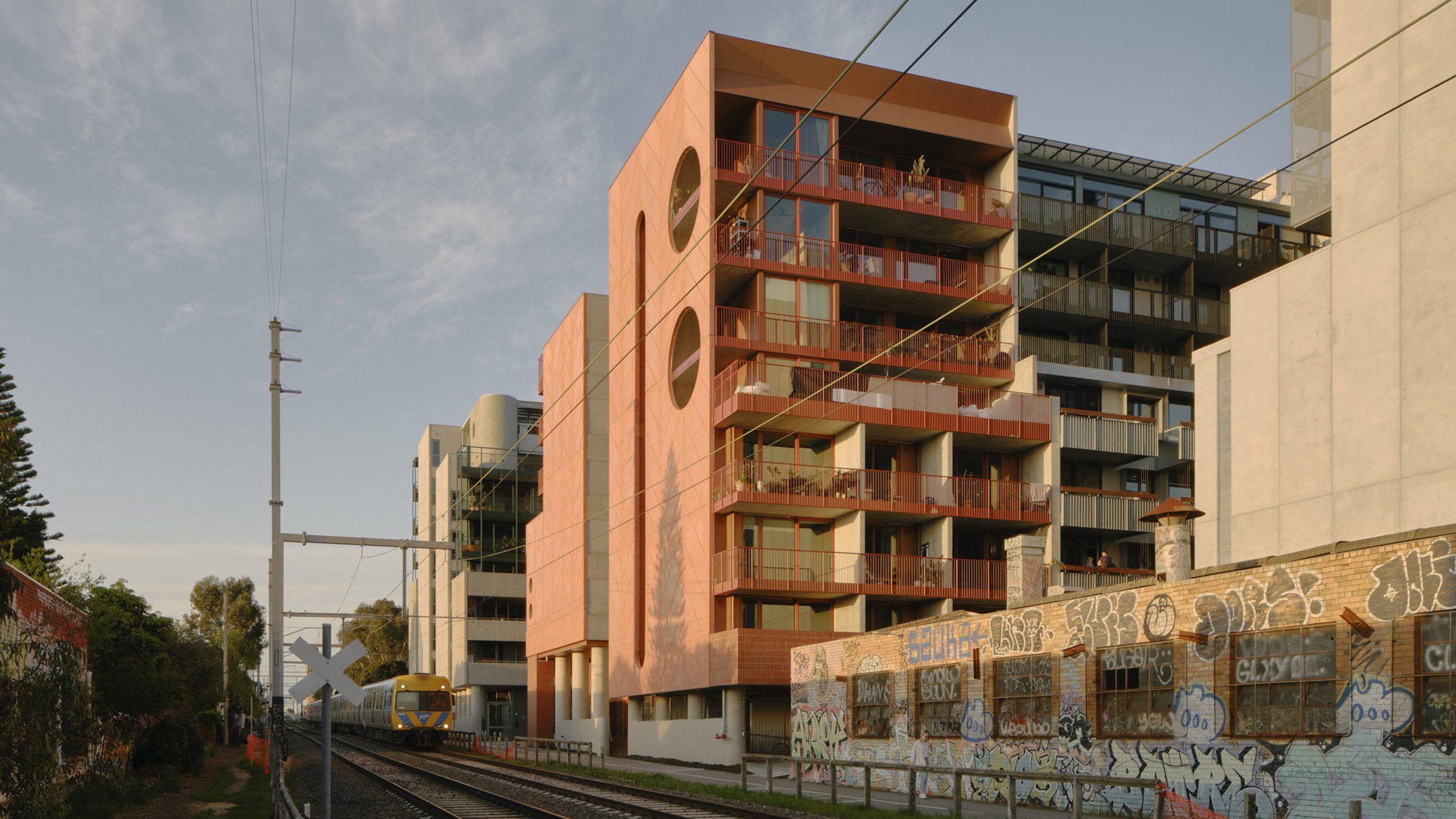

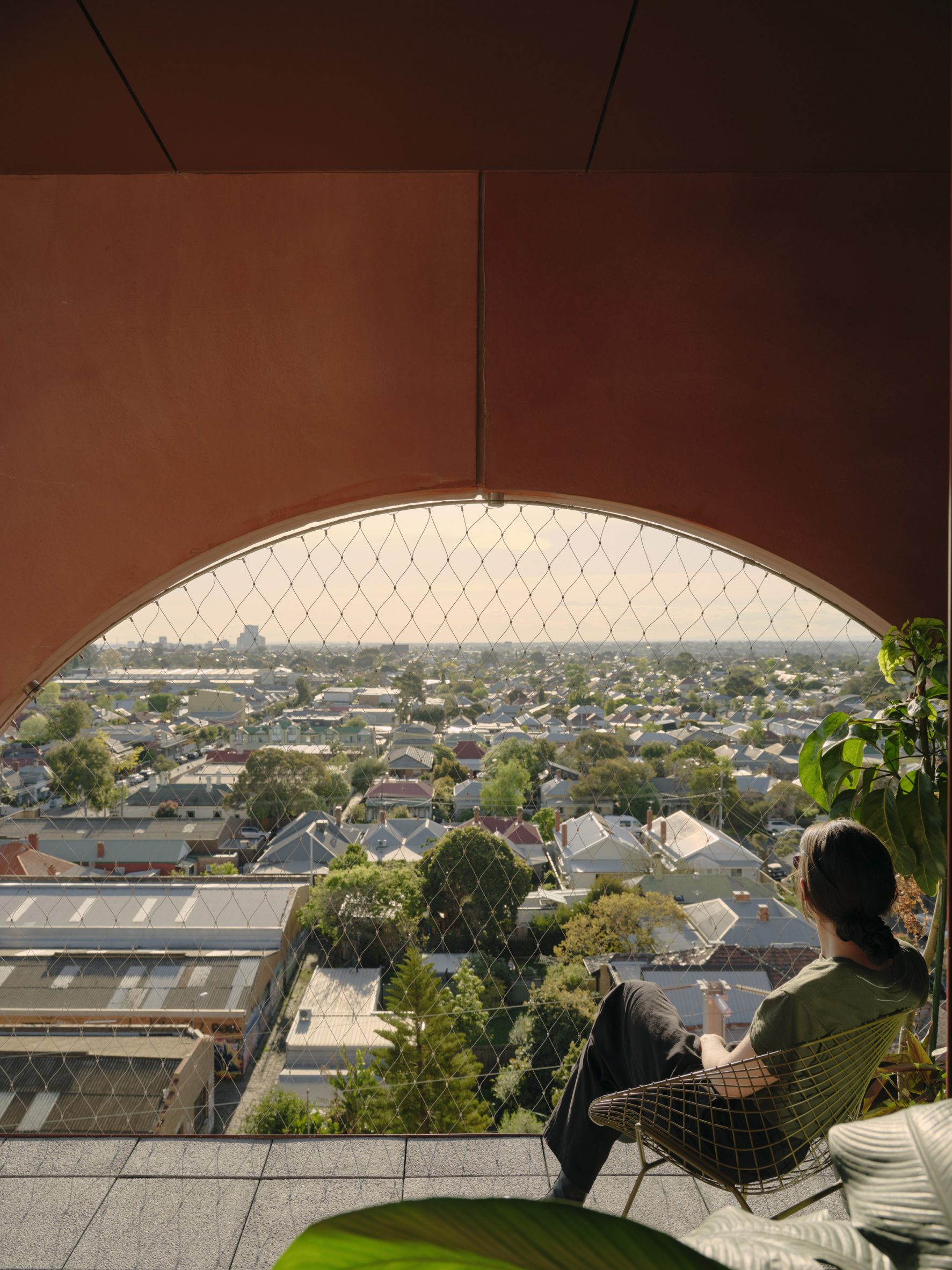
Australian studio Kennedy Nolan has completed Leftfield, an affordable housing block with a "playful" form of pigmented precast concrete panels in the Brunswick neighbourhood of Melbourne. Part of the Nightingale Village development, the block by Kennedy Nolan is an example of a typology created under the Nightingale development model, which aims to design residential projects that are "environmentally, socially and financially sustainable". The entire village has been longlisted in the Housing project category of the Dezeen Awards.
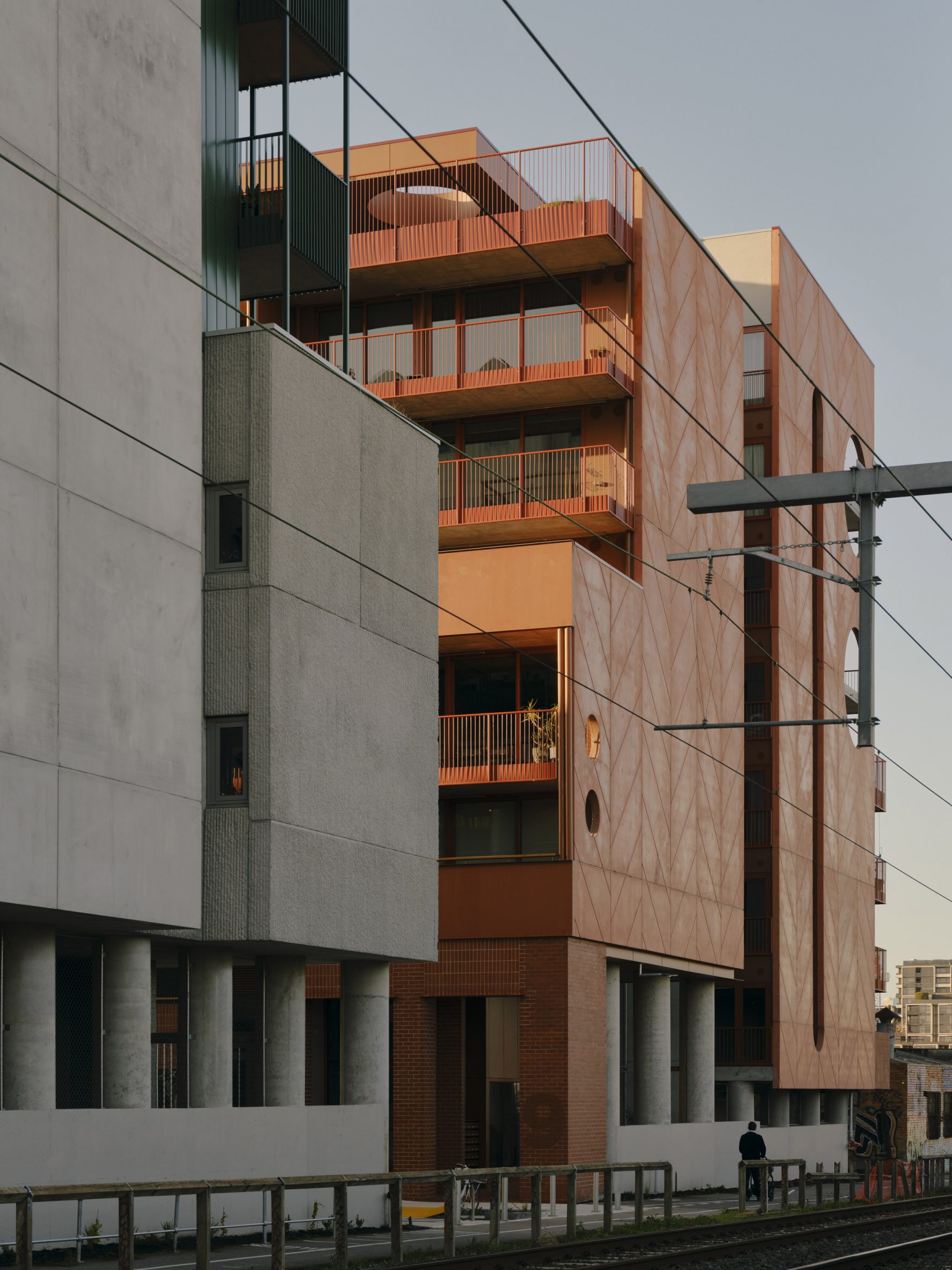

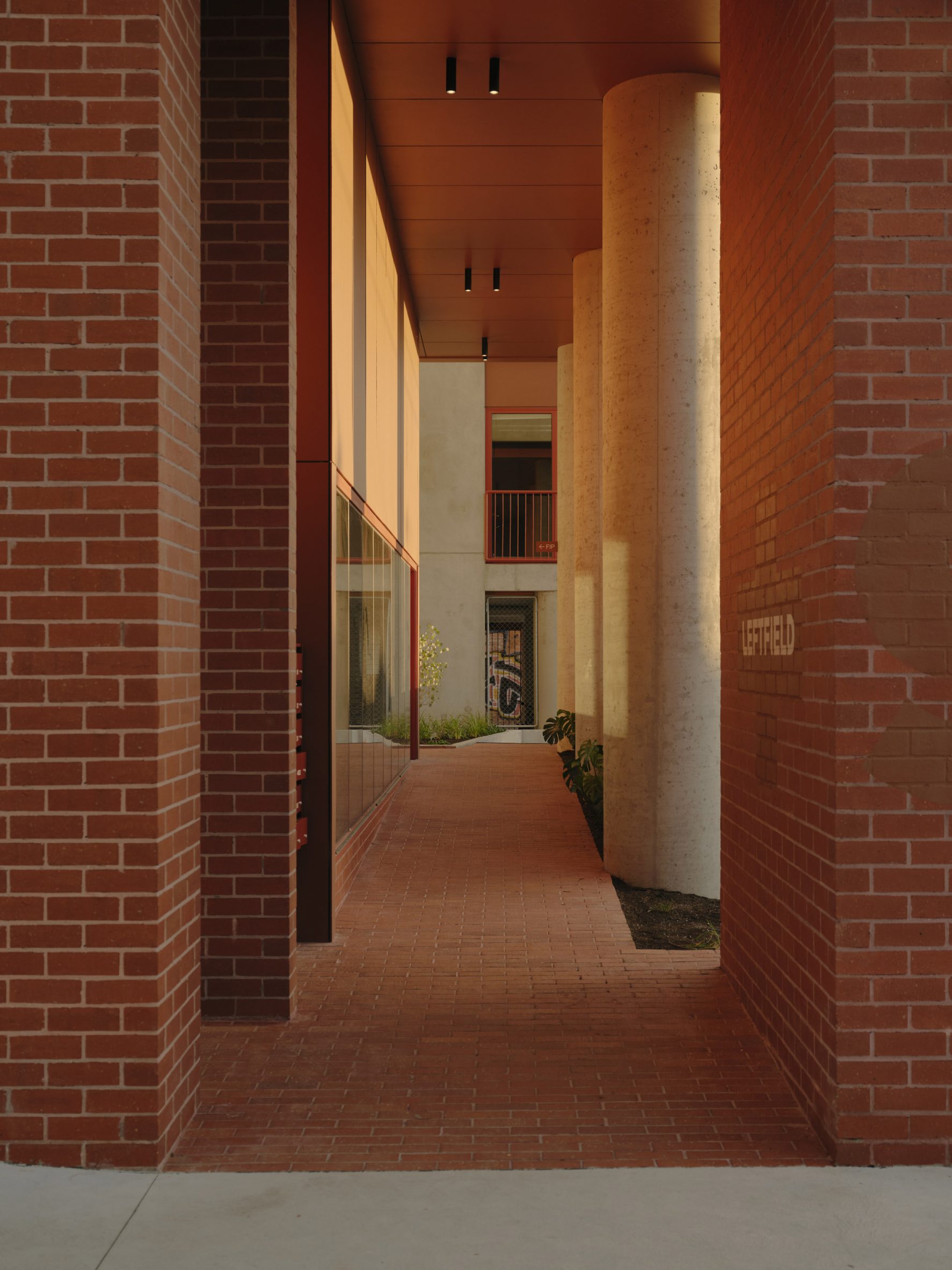
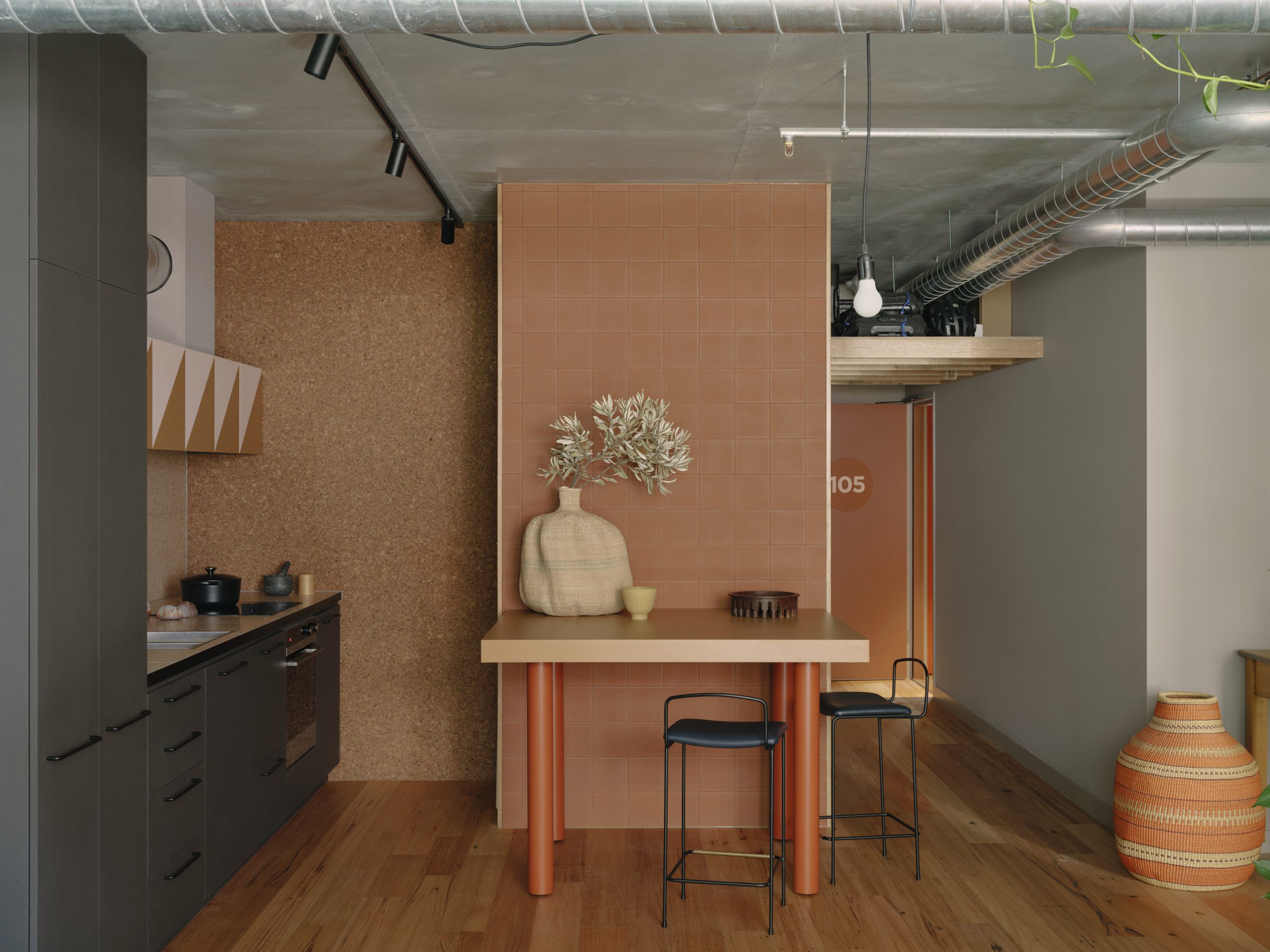
Acting as a developer for the project, Kennedy Nolan aimed to imbue its building of 28 homes with "personality" to give it a welcoming presence in the urban block in which it sits. "Our methodology always looks to do more with less," said studio founder Patrick Kennedy. "This meant identifying fundamental parts of the building and thinking about ways to manipulate or deploy them to make our Nightingale feel domestic, warm, textural and particular."
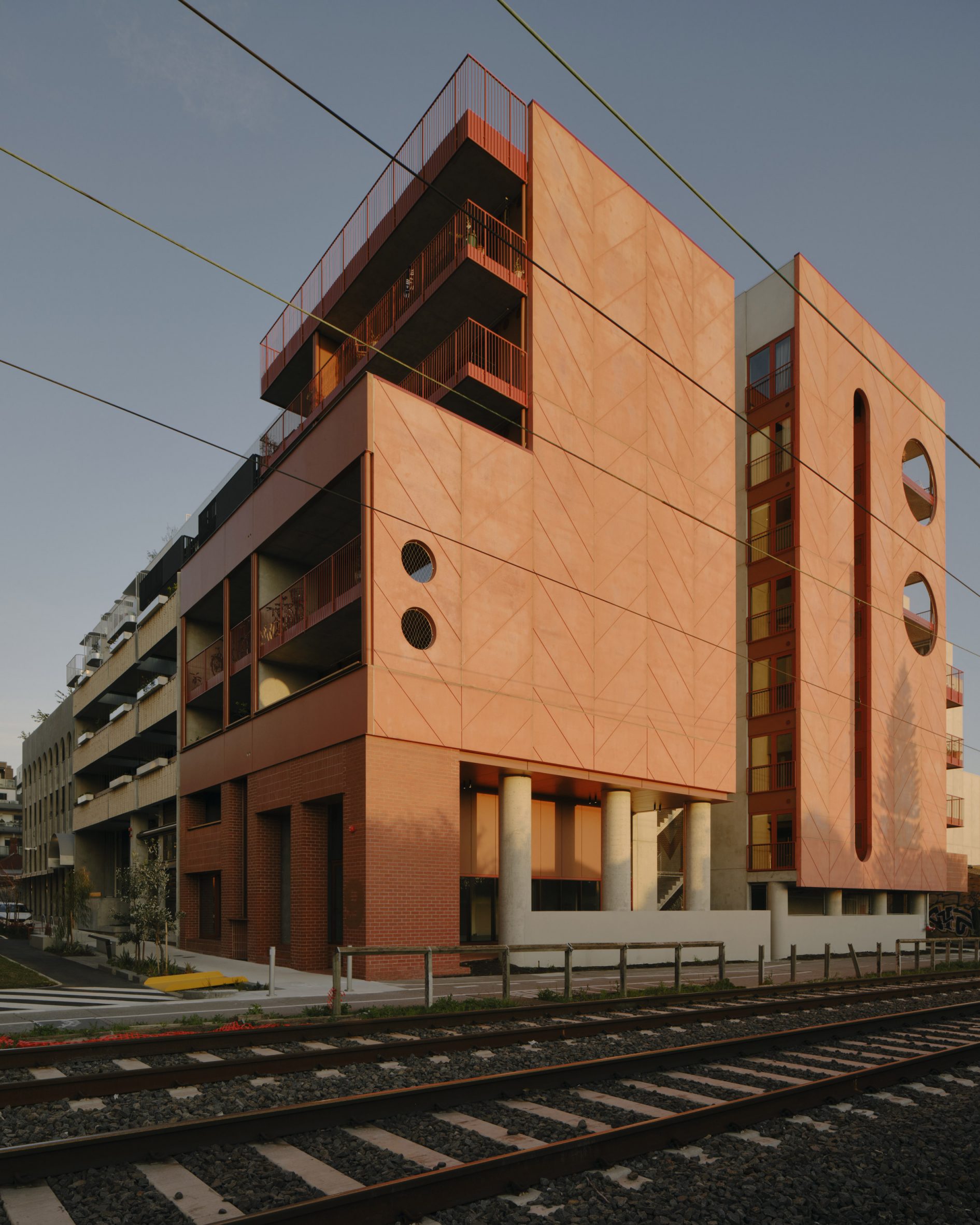
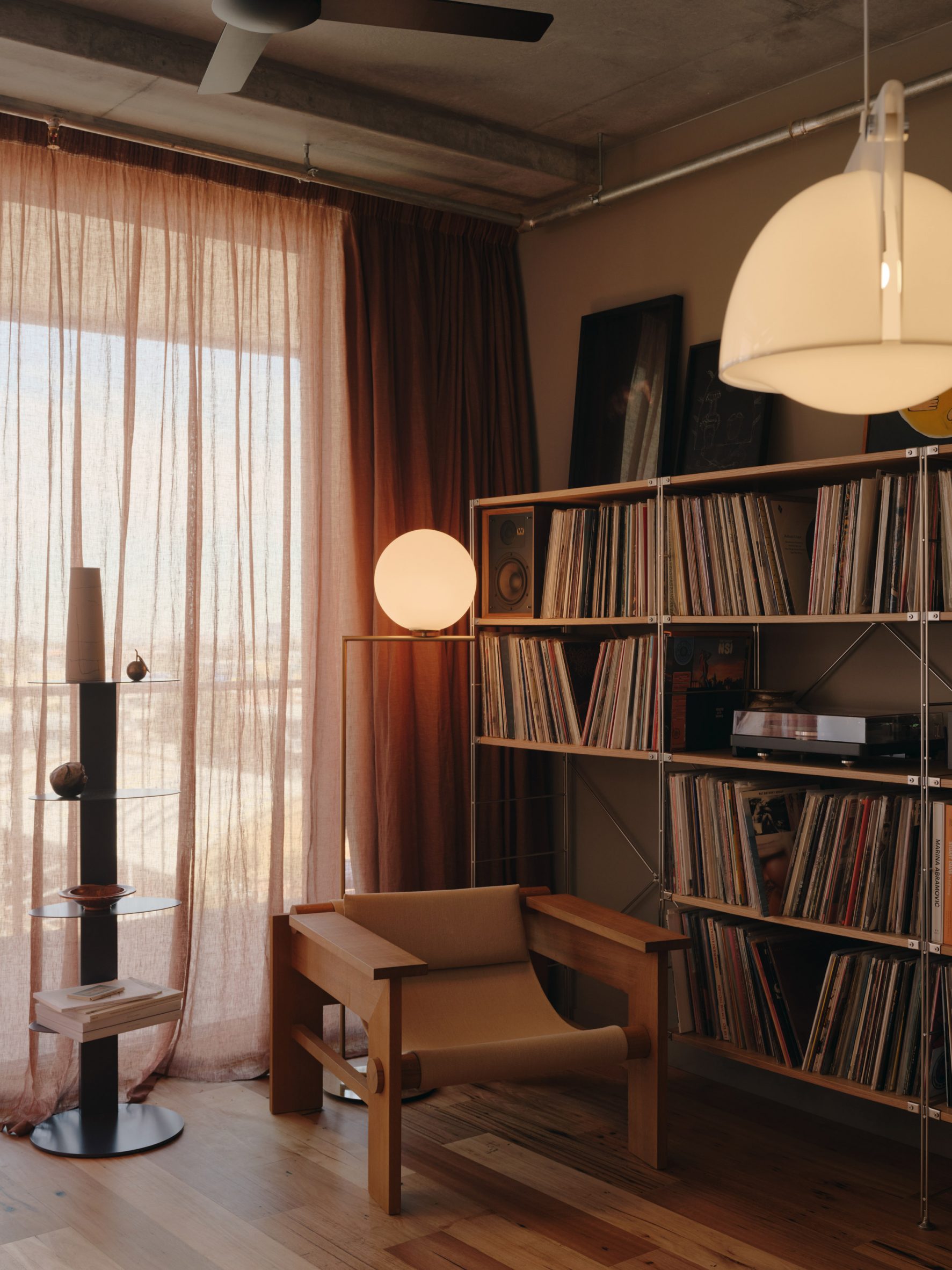
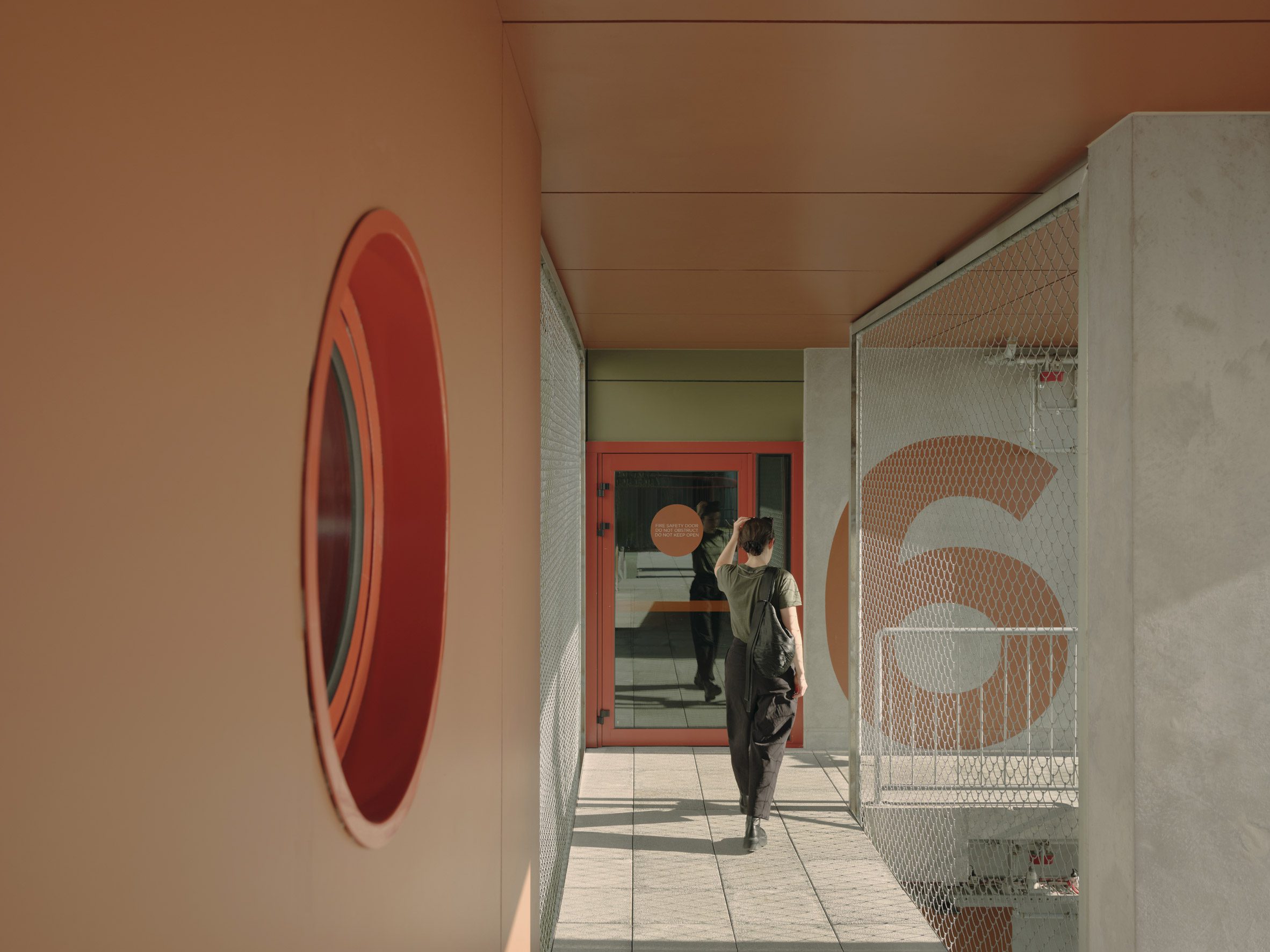

Located in an urban block adjacent to a railway line and surrounded by industrial warehouses to the south, single family homes to the west, and larger apartment and office blocks to the north and east, the project is prominently positioned and is visible across Brunswick. Large-scale geometric compositions of oculi on the building's western facade create a generous "urban-scale gesture" to the surrounding neighbourhood, according to the studio.
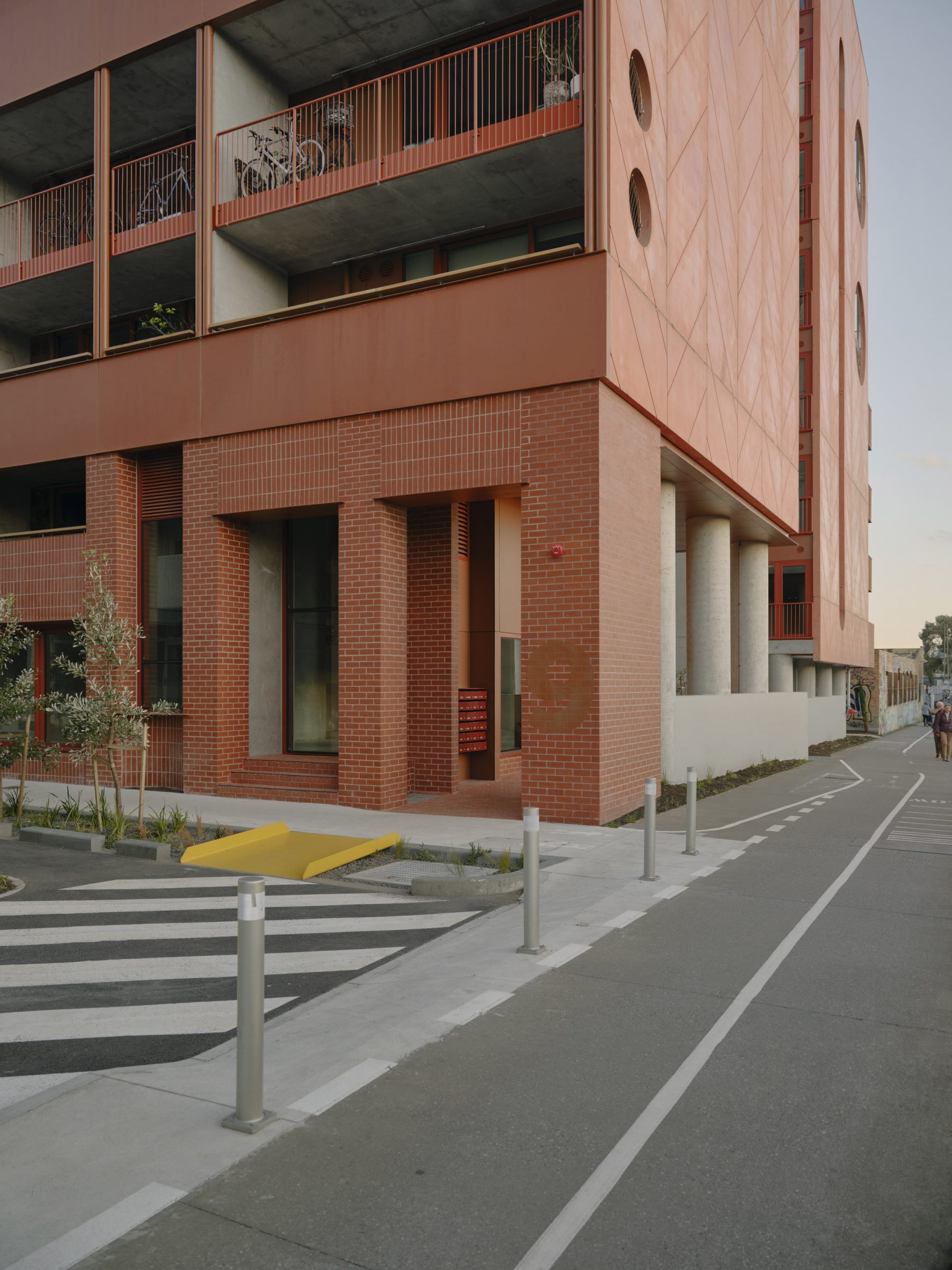
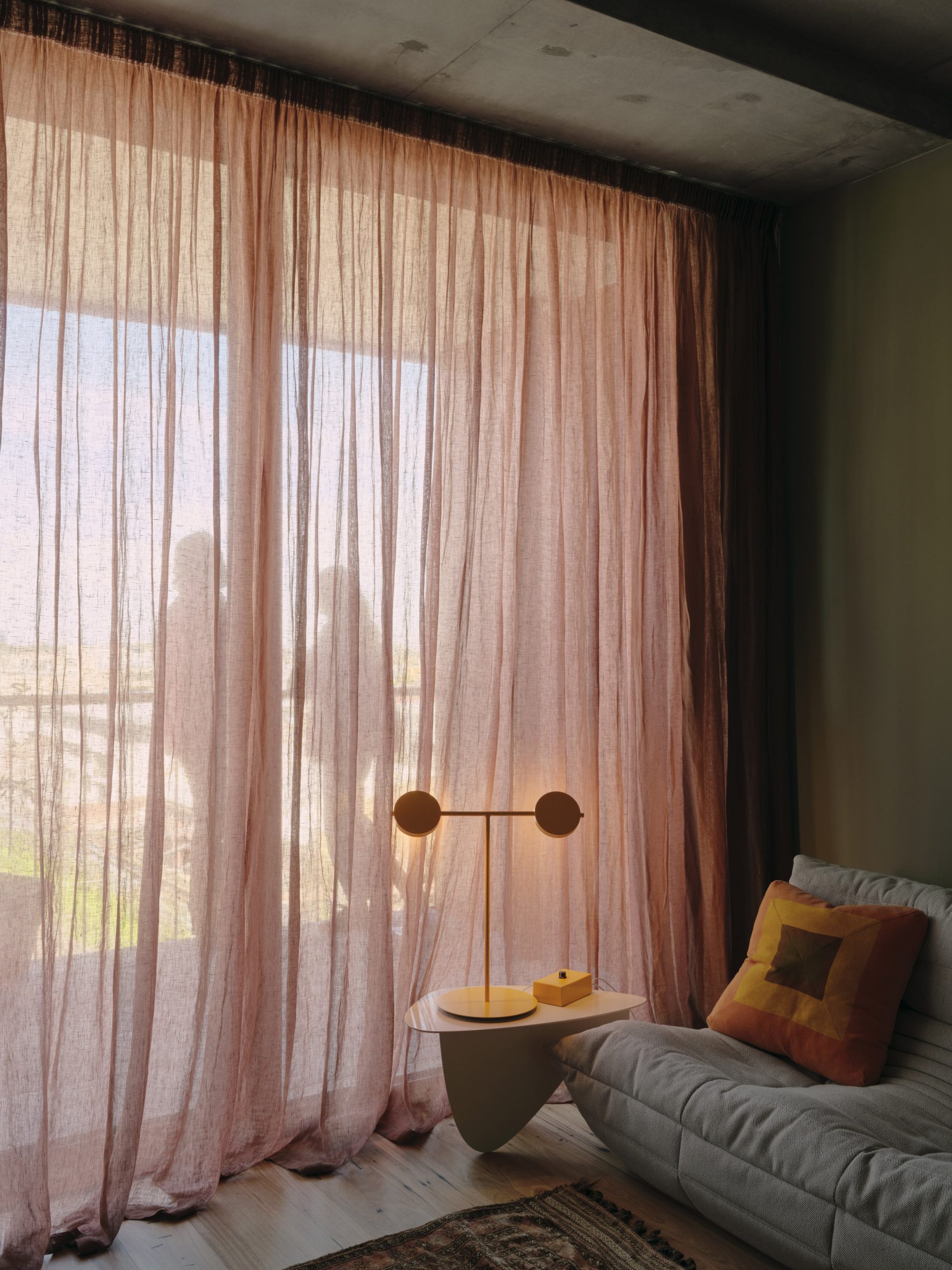

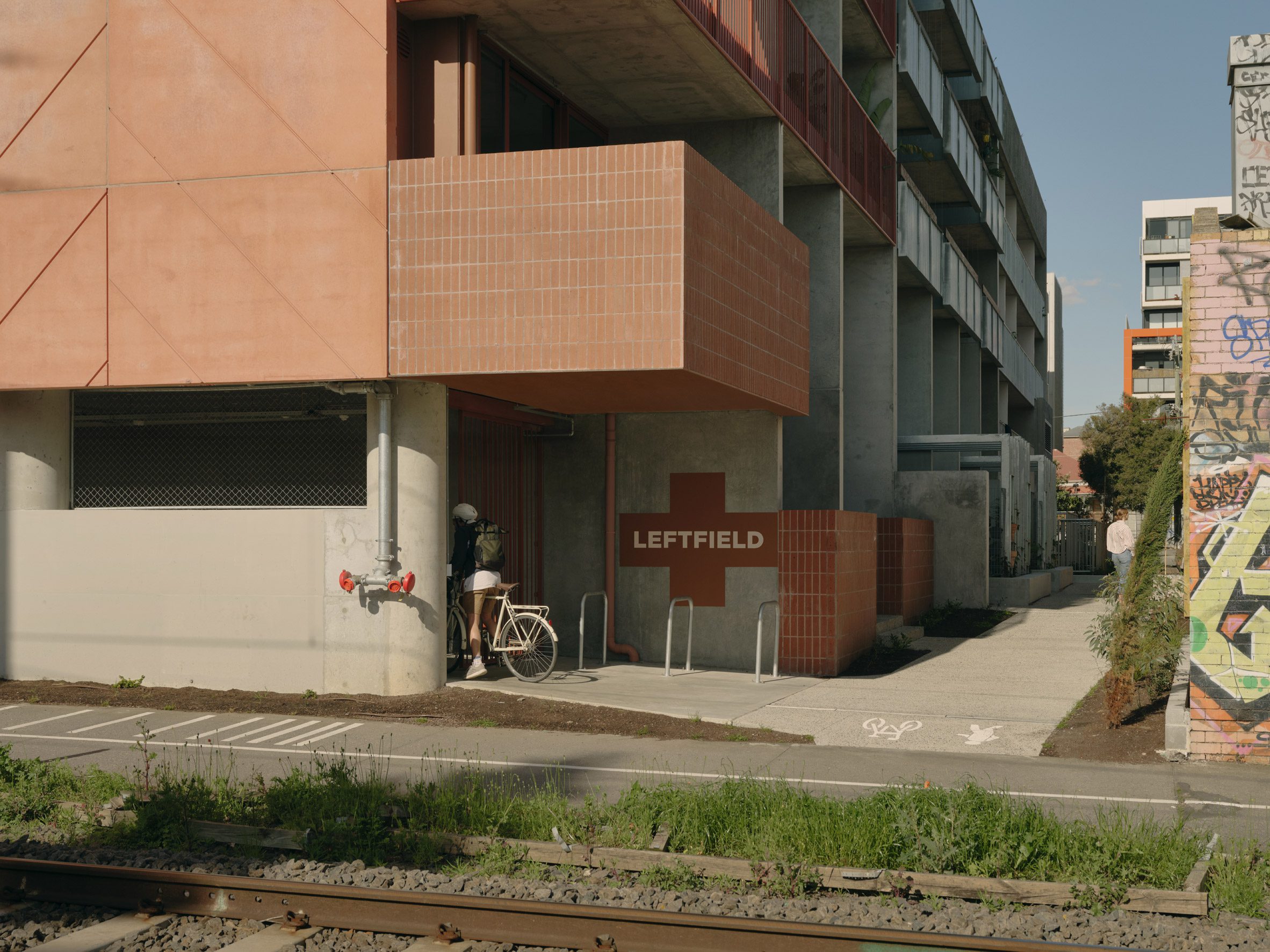
The warm tint of the ochre precast concrete panels used on the building's facades glows in the afternoon sun, while the inlaid chevron pattern provides texture and contributes to its pictorial imagery. "We were motivated to make the building sober, handsome and warm - qualities which are domestic or which can instil domestic pride," explained Kennedy.
snip
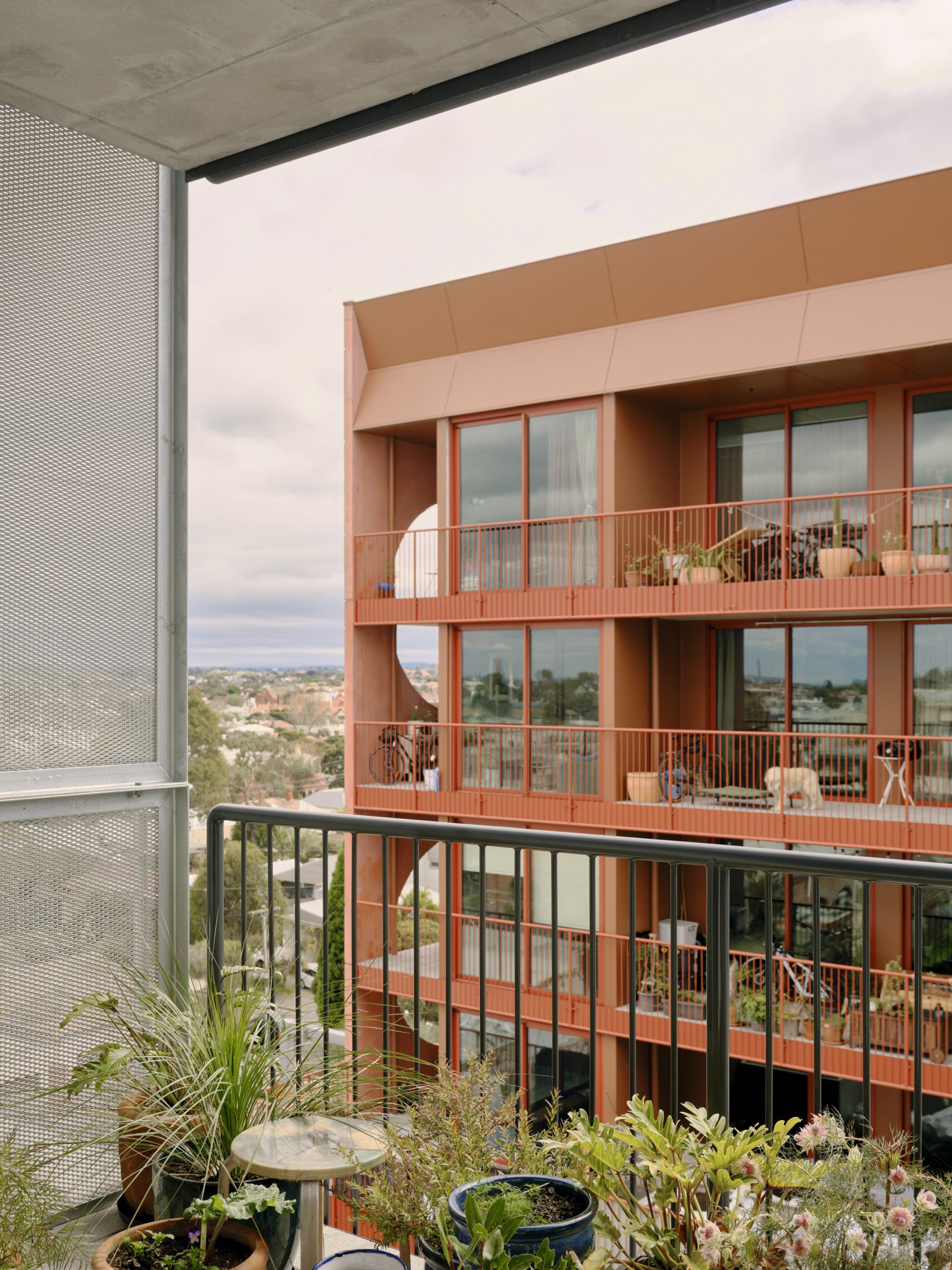
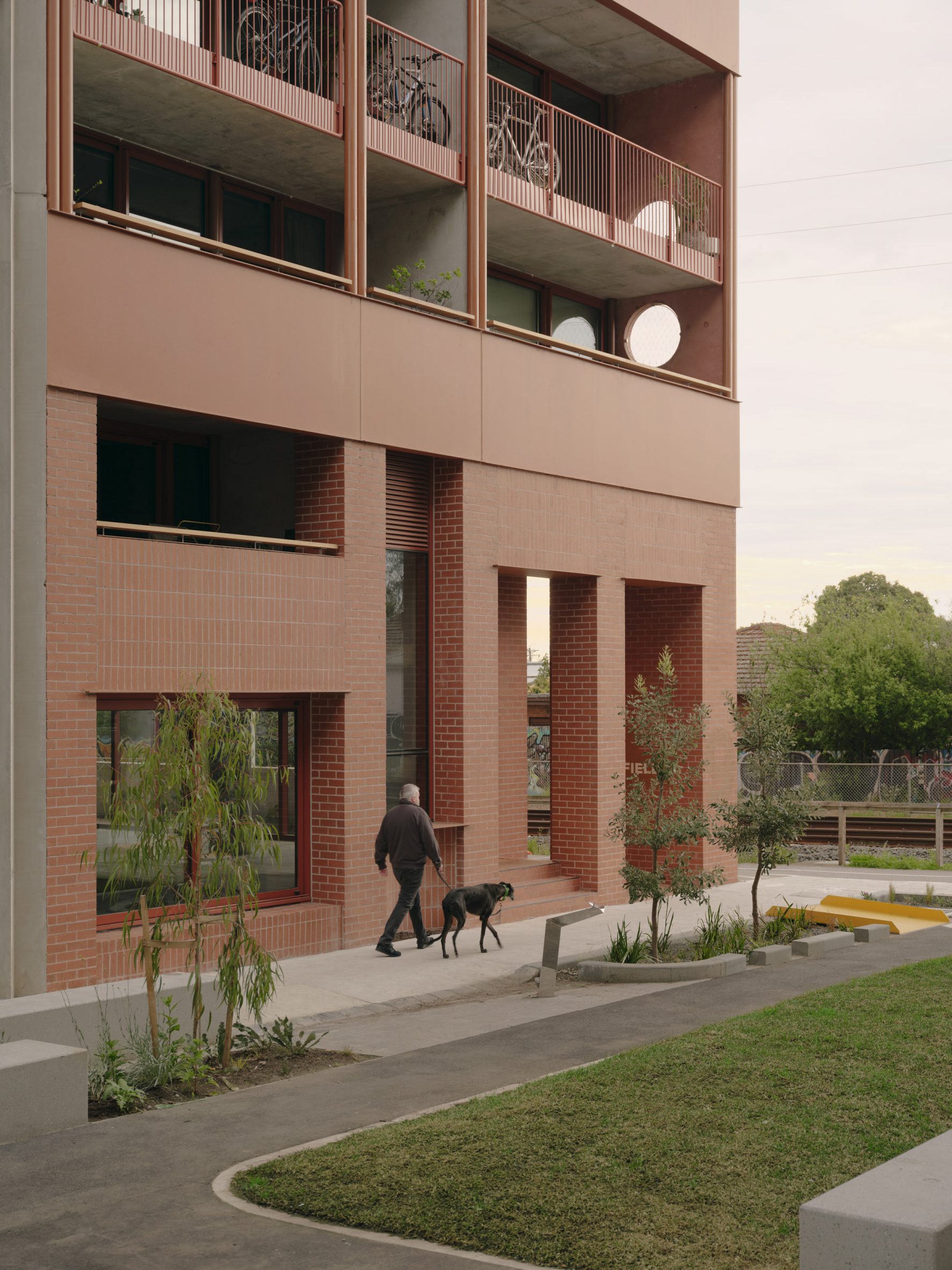
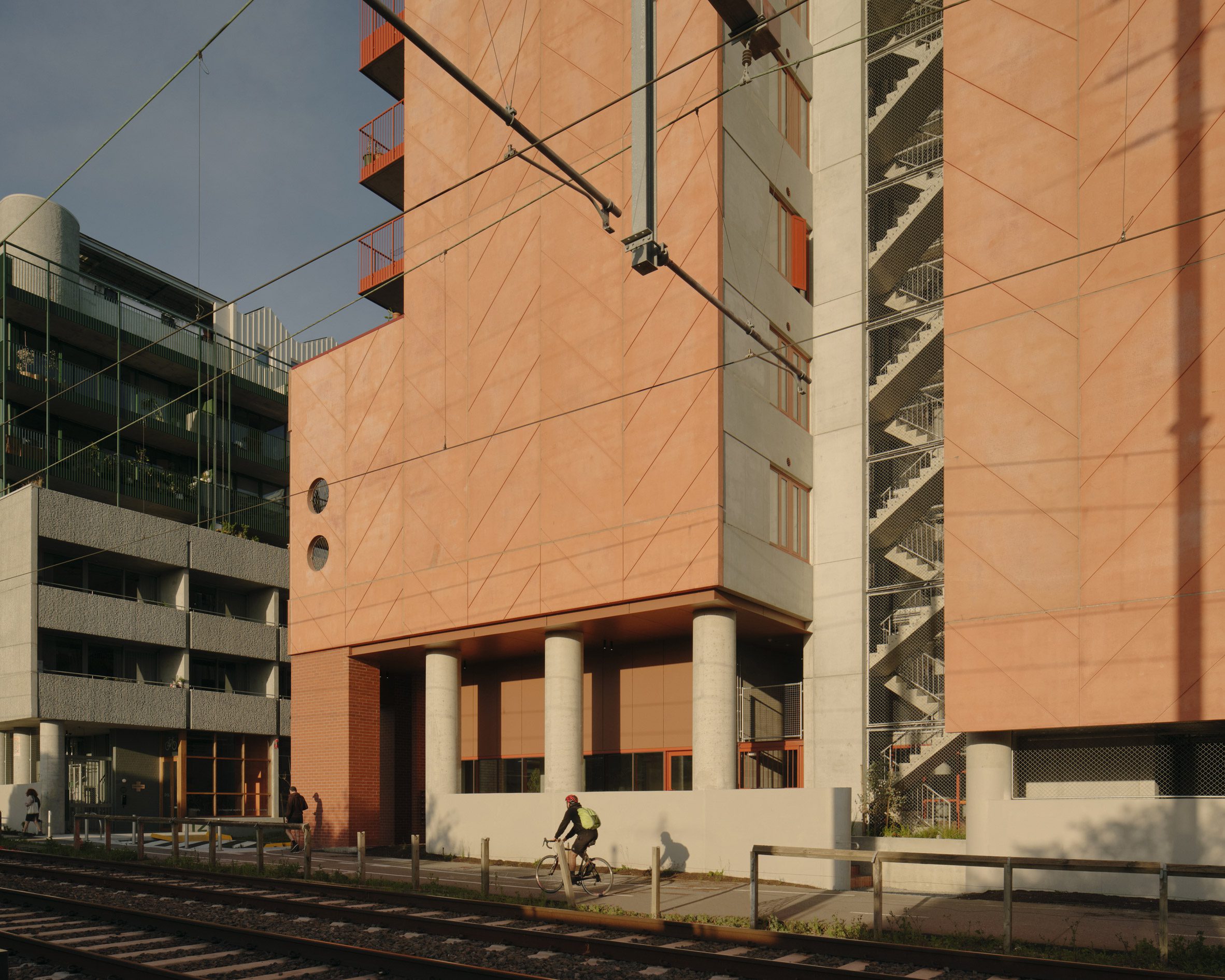
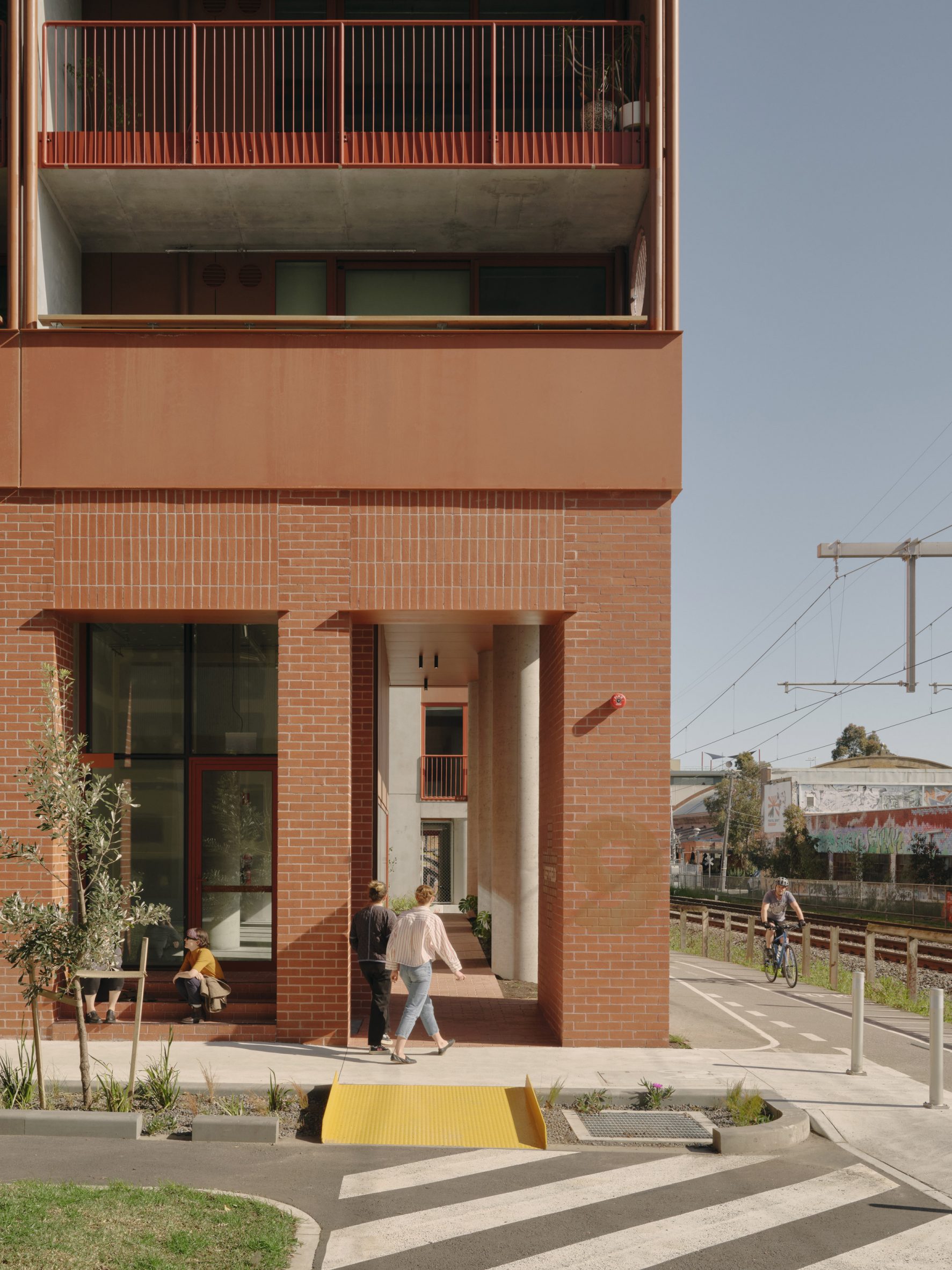


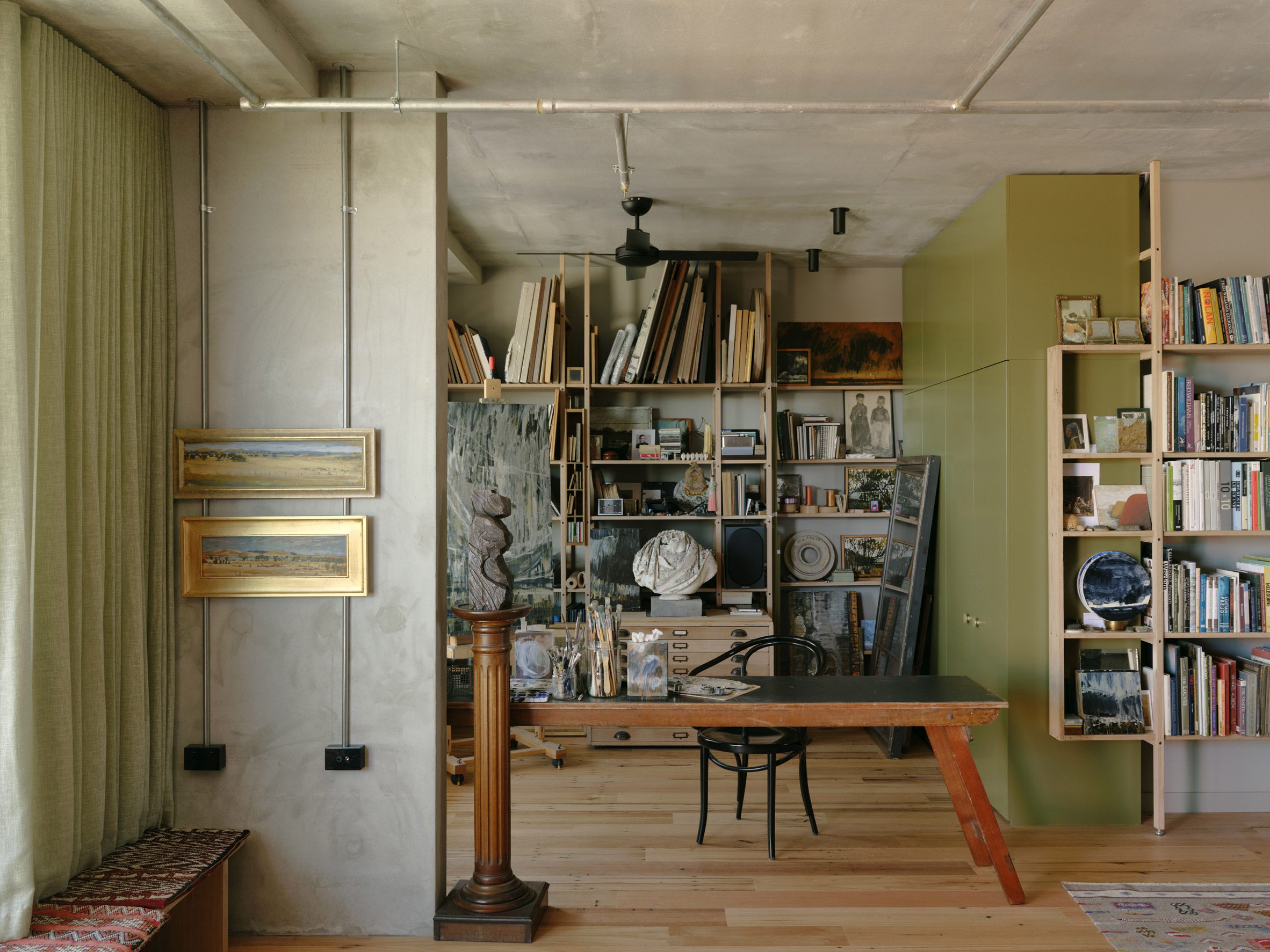

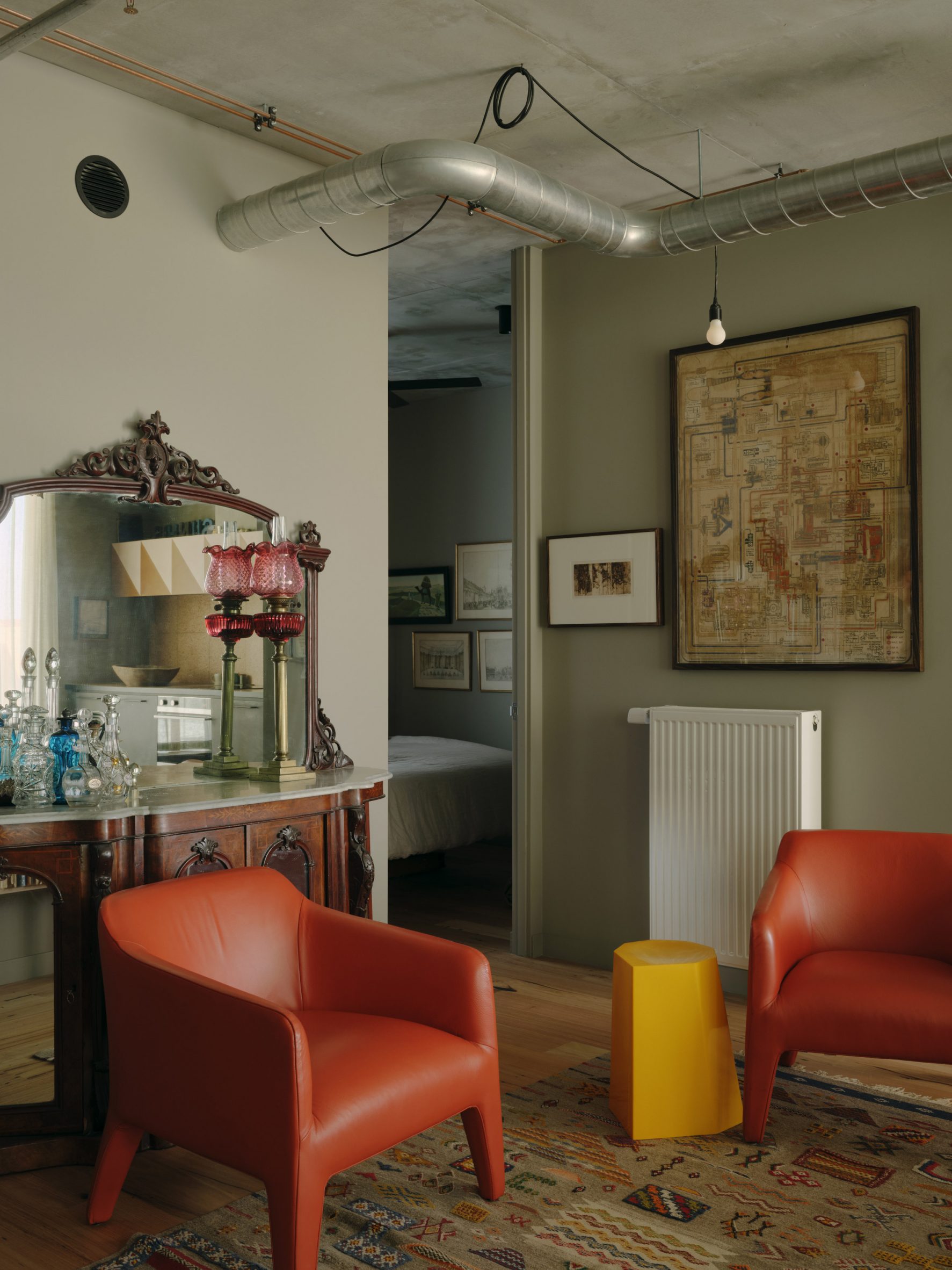
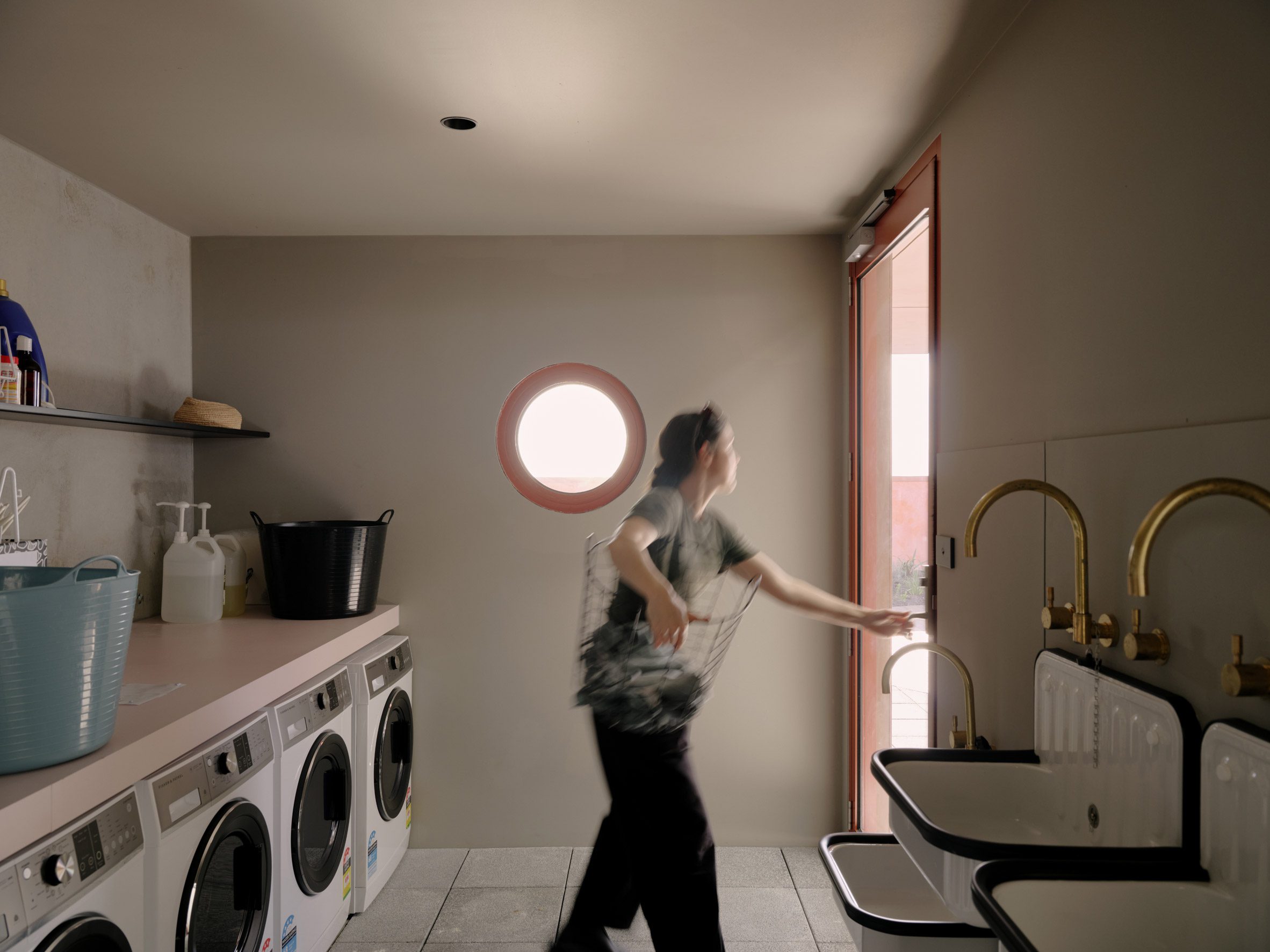

Ochre-tinted precast concrete forms Nightingale housing by Kennedy Nolan
https://www.dezeen.com/2023/09/22/ochre-precast-concrete-nightingale-housing-kennedy-nolan-australia/


Australian studio Kennedy Nolan has completed Leftfield, an affordable housing block with a "playful" form of pigmented precast concrete panels in the Brunswick neighbourhood of Melbourne. Part of the Nightingale Village development, the block by Kennedy Nolan is an example of a typology created under the Nightingale development model, which aims to design residential projects that are "environmentally, socially and financially sustainable". The entire village has been longlisted in the Housing project category of the Dezeen Awards.




Acting as a developer for the project, Kennedy Nolan aimed to imbue its building of 28 homes with "personality" to give it a welcoming presence in the urban block in which it sits. "Our methodology always looks to do more with less," said studio founder Patrick Kennedy. "This meant identifying fundamental parts of the building and thinking about ways to manipulate or deploy them to make our Nightingale feel domestic, warm, textural and particular."




Located in an urban block adjacent to a railway line and surrounded by industrial warehouses to the south, single family homes to the west, and larger apartment and office blocks to the north and east, the project is prominently positioned and is visible across Brunswick. Large-scale geometric compositions of oculi on the building's western facade create a generous "urban-scale gesture" to the surrounding neighbourhood, according to the studio.




The warm tint of the ochre precast concrete panels used on the building's facades glows in the afternoon sun, while the inlaid chevron pattern provides texture and contributes to its pictorial imagery. "We were motivated to make the building sober, handsome and warm - qualities which are domestic or which can instil domestic pride," explained Kennedy.
snip











September 28, 2023

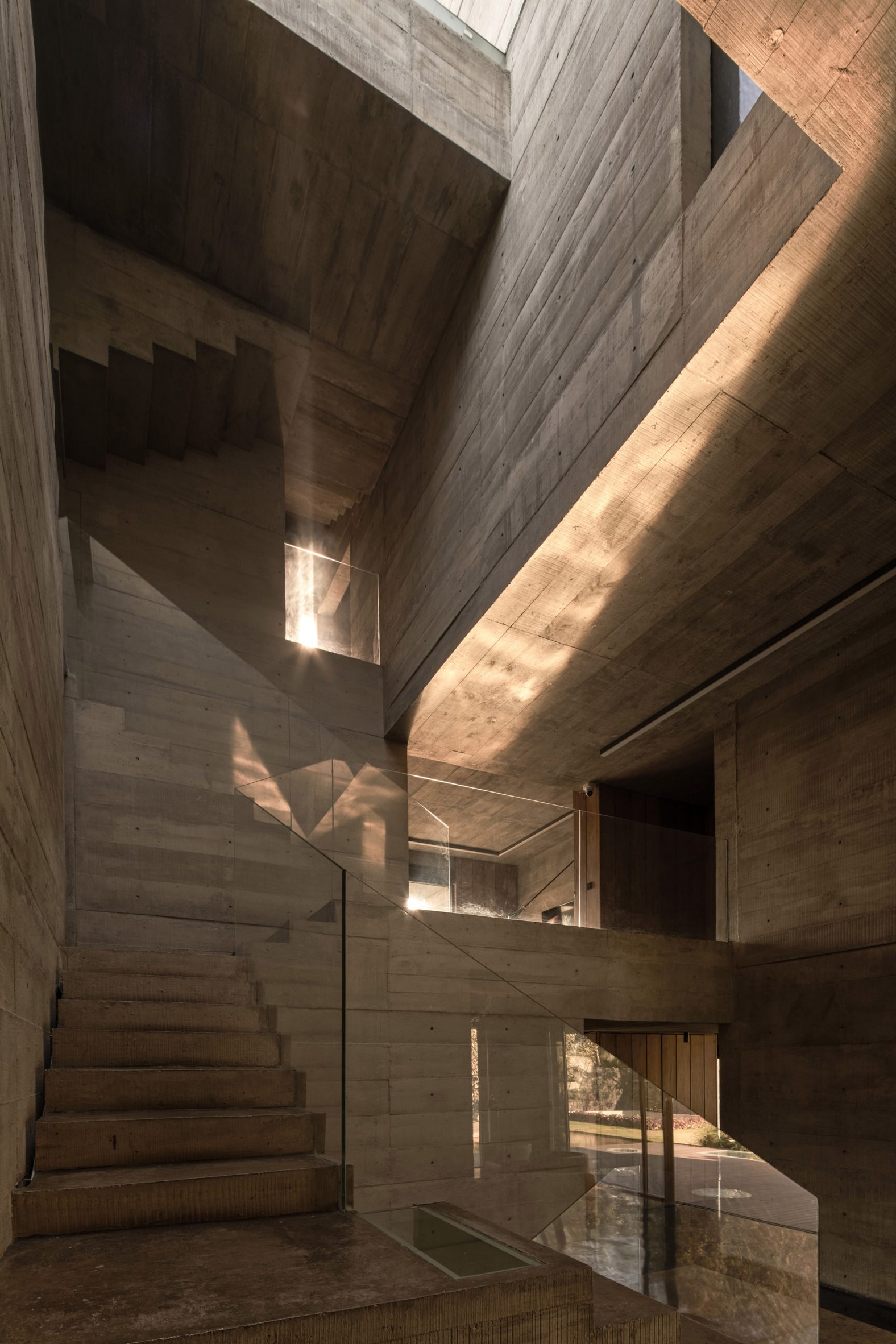
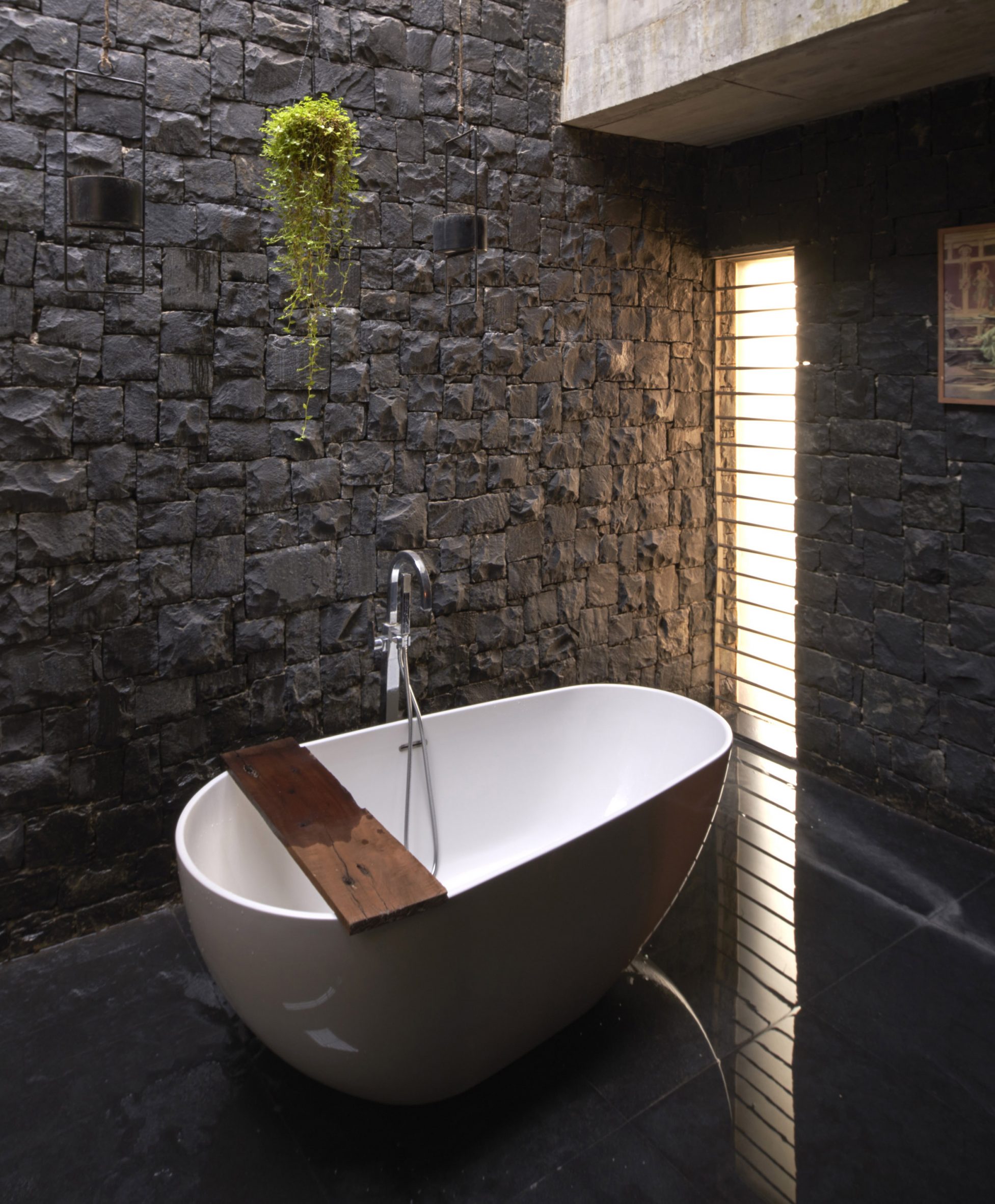
A network of cubic concrete volumes and staircases forms Up to the Sea, a blocky family home that Indian studio Matharoo Associates has added to the coastal town of Dumas, India. Nestled into a grassy site near the coast, the home sits on a stone base and was designed to merge traditional Indian design with modern architecture. The multi-generational home features accommodation for four generations of the client's family, as well as communal spaces that surround a central light-filled stairwell.

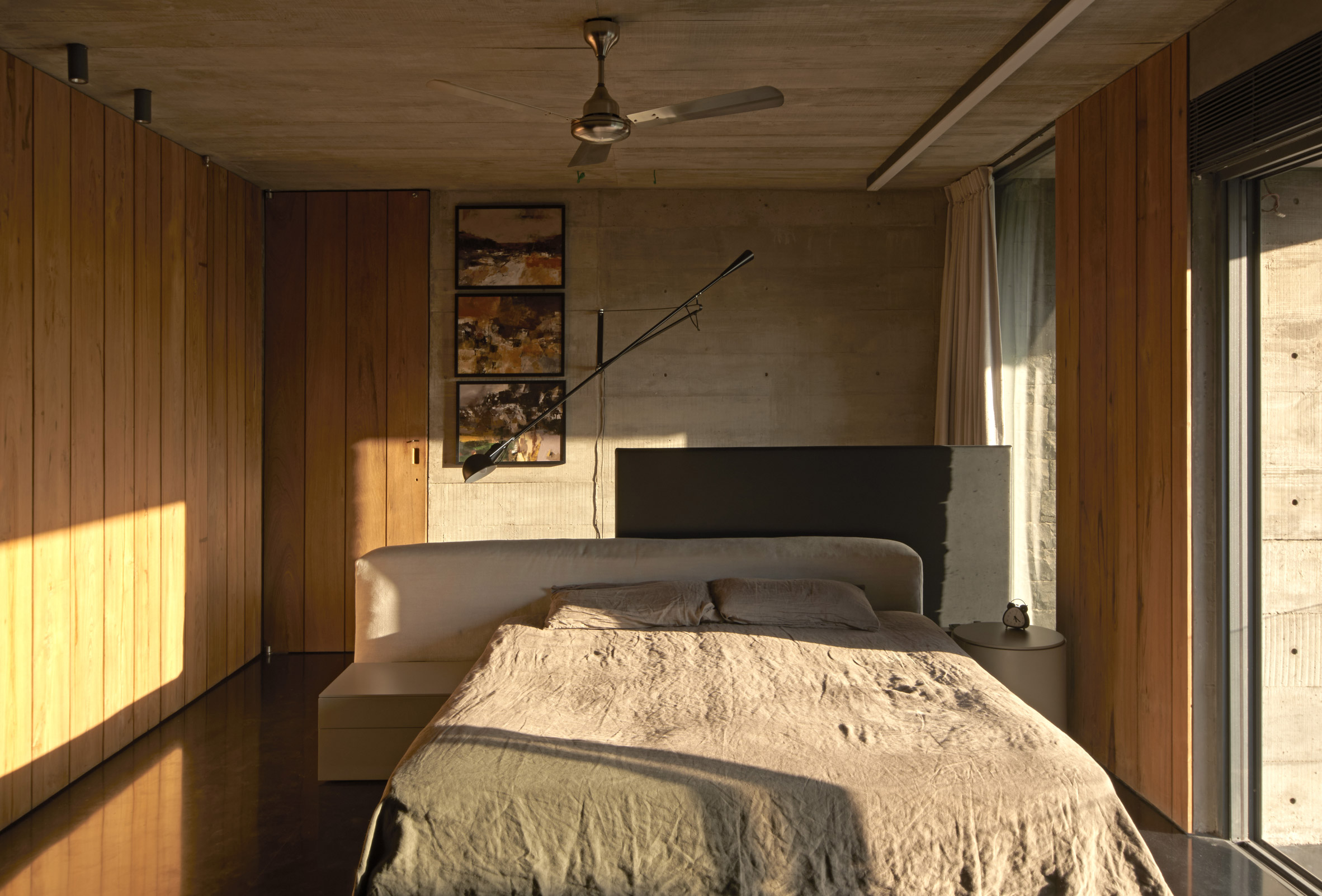

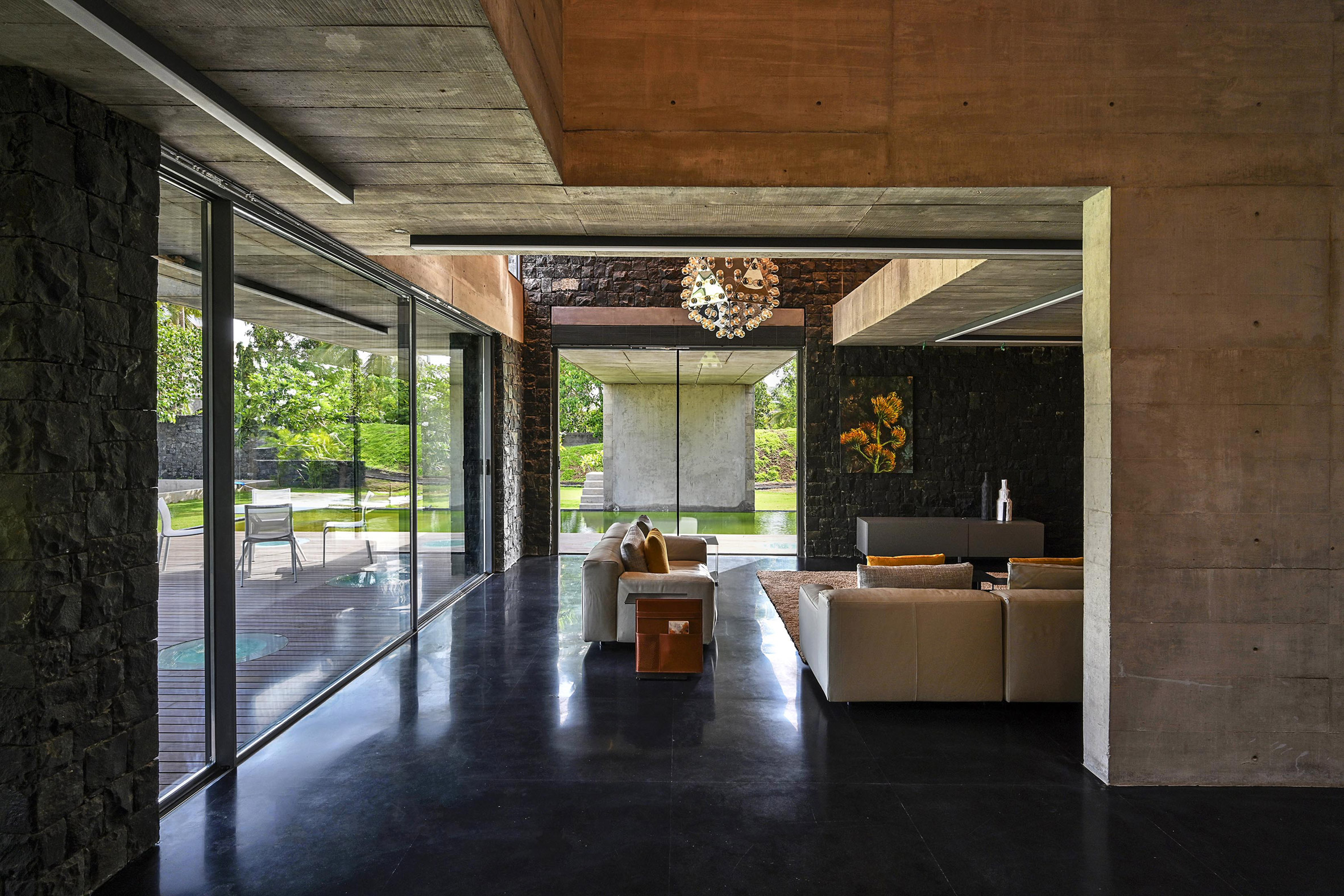
Comprising concrete blocks arranged to frame views of the surrounding landscape and nearby sea, the house wraps around a central void illuminated by a skylight. Informed by ancient Indian stairwells, the void features a series of linear staircases bordered by reflective balustrades, which wrap around the edges of the stairwell and connect to balconies on each level.

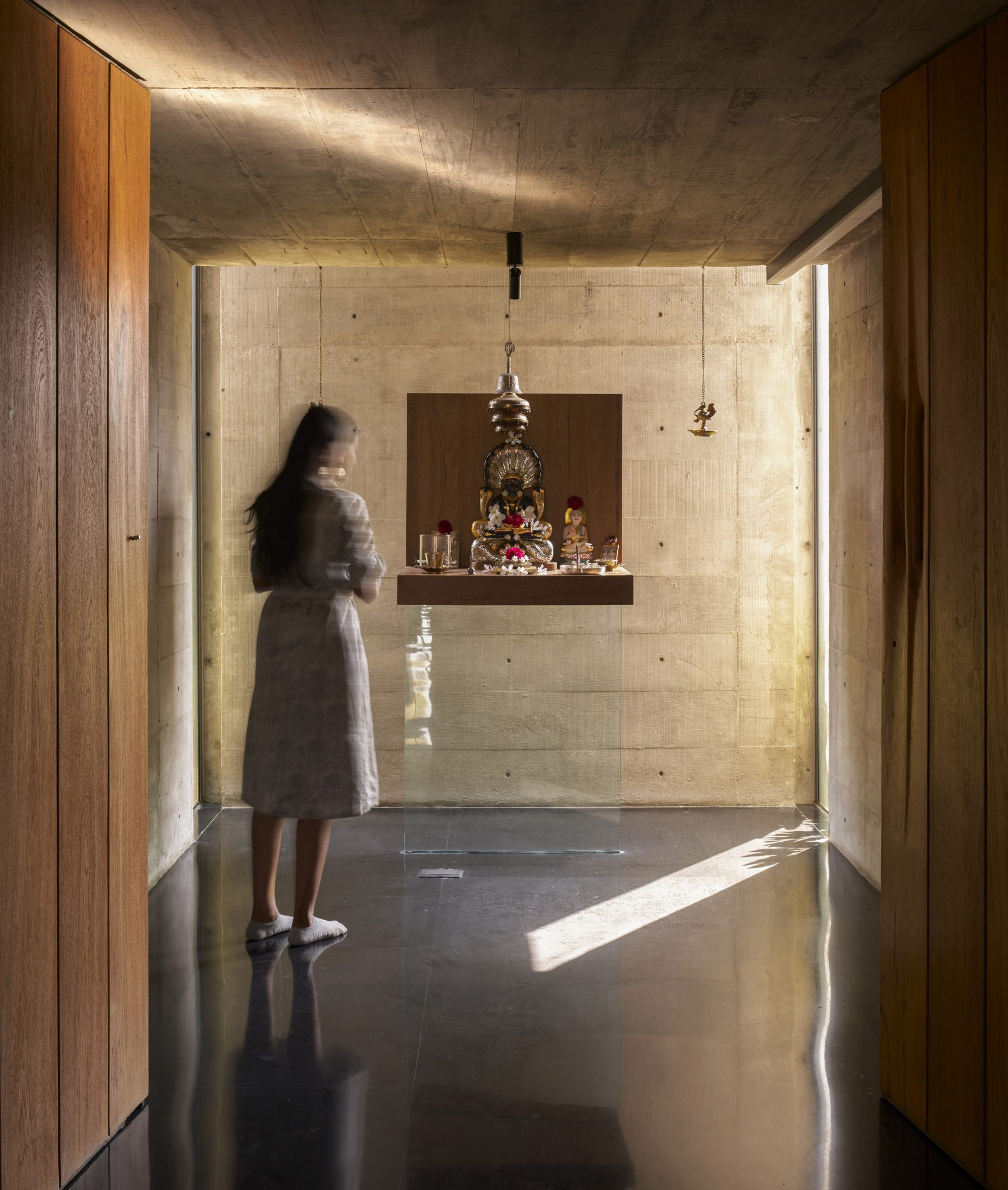
Around the stairwell, Matharoo Associates arranged a series of private living spaces to house the four generations of the family. Aiming to give each family member a private space, the studio divided the levels into separate suites, while using the staircase to maintain a degree of connection throughout the house.

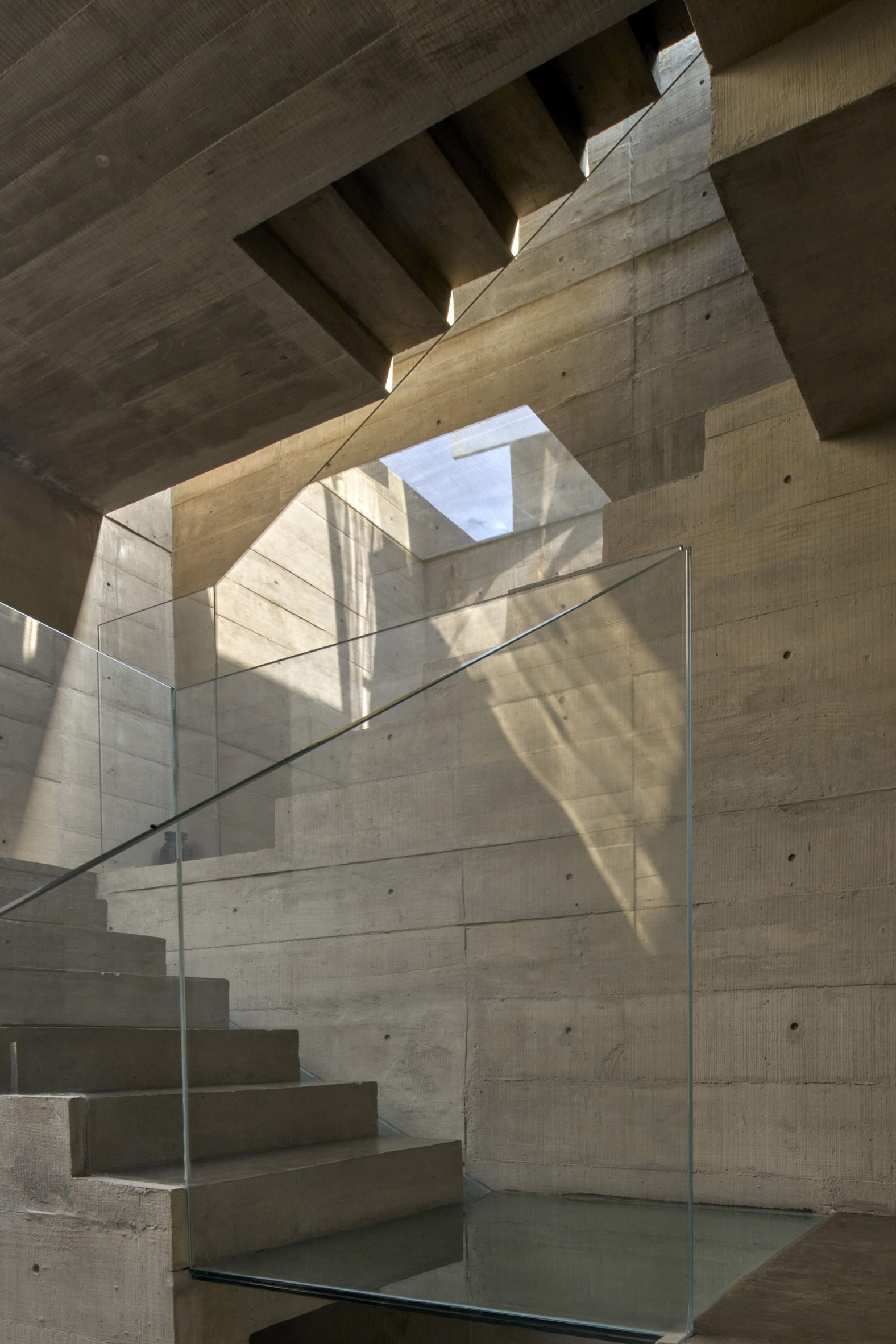
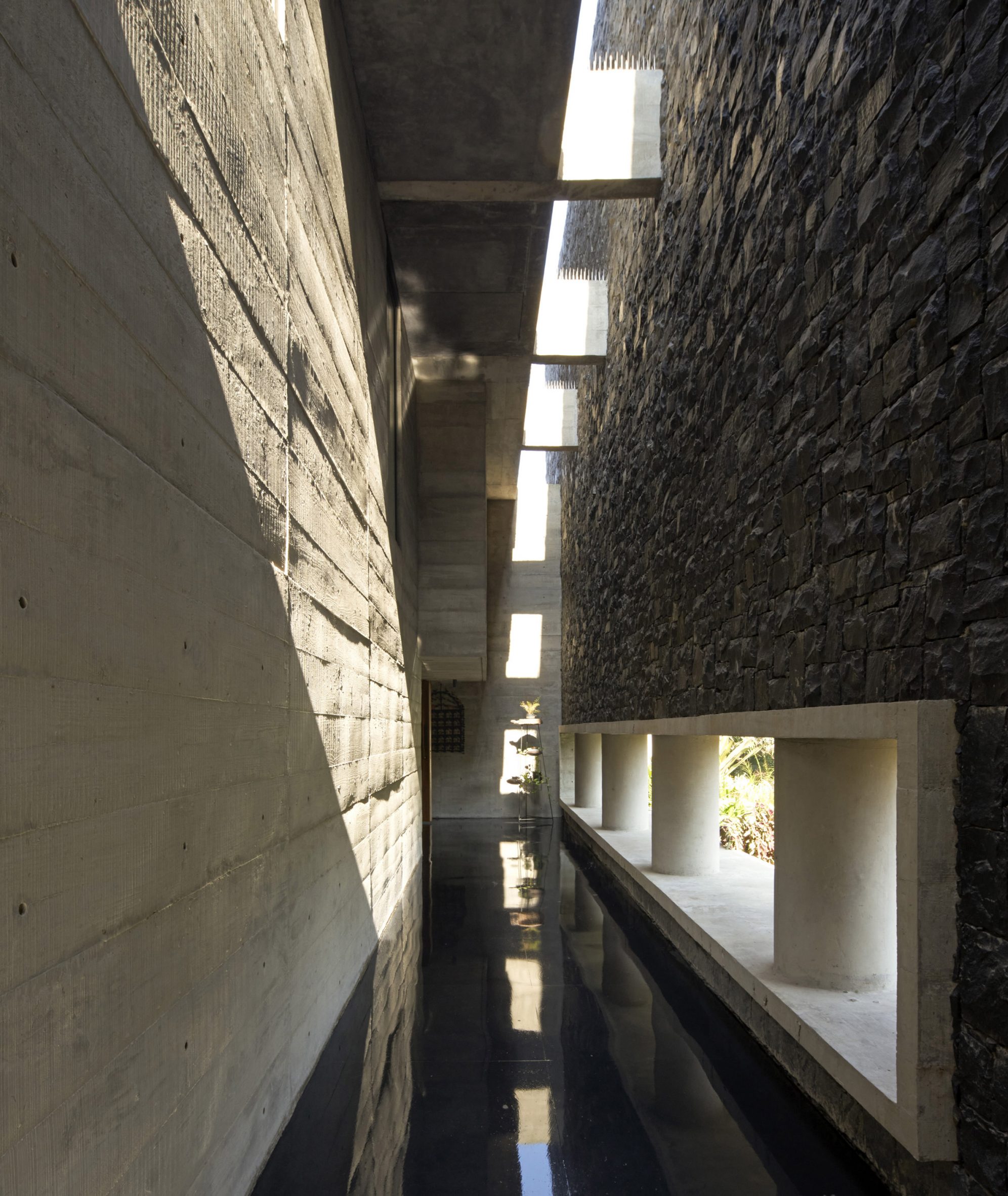
“Four generations spread across eighty years each have their own set of demands, so they were given their own private domains while remaining connected,” architect Simran Goyal told Dezeen. The first floor contains a guest suite for the client's daughter and her family, while the second floor features two separate areas, including a main couple suite as well as a space for the family's son and his family.
snip
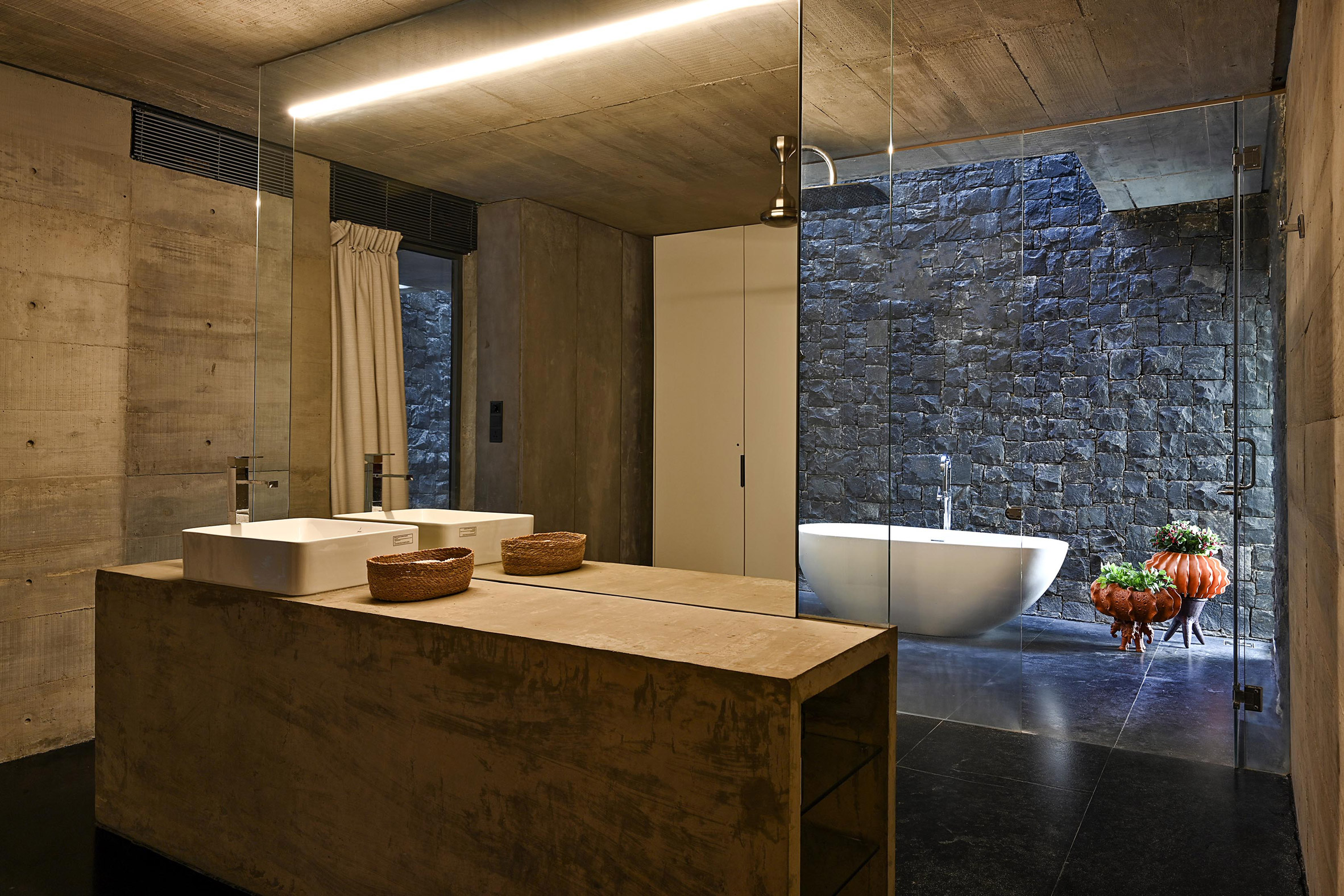
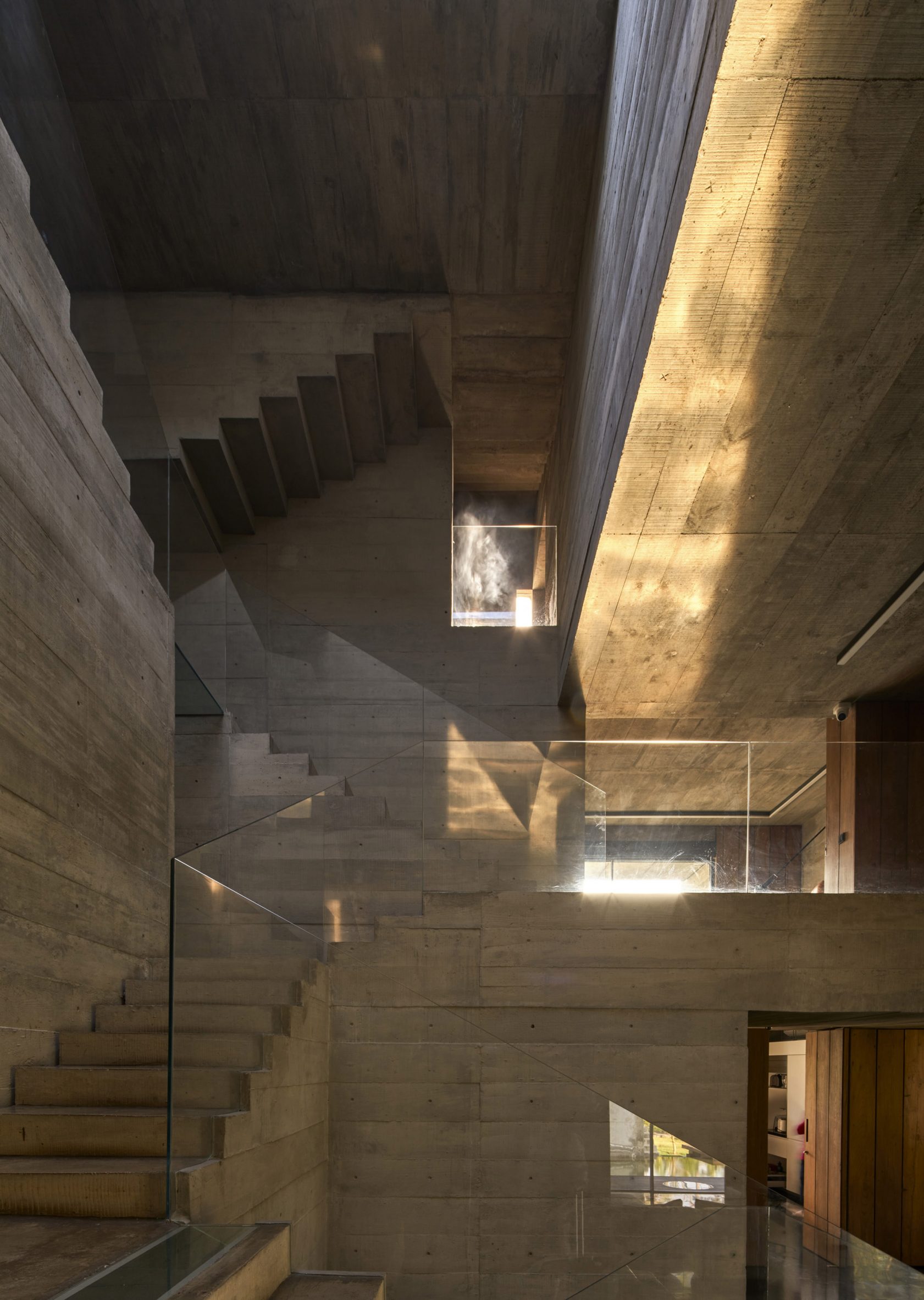
Matharoo Associates wraps concrete home around light-filled stairwell in Dumas, India
https://www.dezeen.com/2023/09/21/matharoo-associates-up-to-the-sea-concrete-home-india-residential/


A network of cubic concrete volumes and staircases forms Up to the Sea, a blocky family home that Indian studio Matharoo Associates has added to the coastal town of Dumas, India. Nestled into a grassy site near the coast, the home sits on a stone base and was designed to merge traditional Indian design with modern architecture. The multi-generational home features accommodation for four generations of the client's family, as well as communal spaces that surround a central light-filled stairwell.




Comprising concrete blocks arranged to frame views of the surrounding landscape and nearby sea, the house wraps around a central void illuminated by a skylight. Informed by ancient Indian stairwells, the void features a series of linear staircases bordered by reflective balustrades, which wrap around the edges of the stairwell and connect to balconies on each level.


Around the stairwell, Matharoo Associates arranged a series of private living spaces to house the four generations of the family. Aiming to give each family member a private space, the studio divided the levels into separate suites, while using the staircase to maintain a degree of connection throughout the house.



“Four generations spread across eighty years each have their own set of demands, so they were given their own private domains while remaining connected,” architect Simran Goyal told Dezeen. The first floor contains a guest suite for the client's daughter and her family, while the second floor features two separate areas, including a main couple suite as well as a space for the family's son and his family.
snip


September 28, 2023


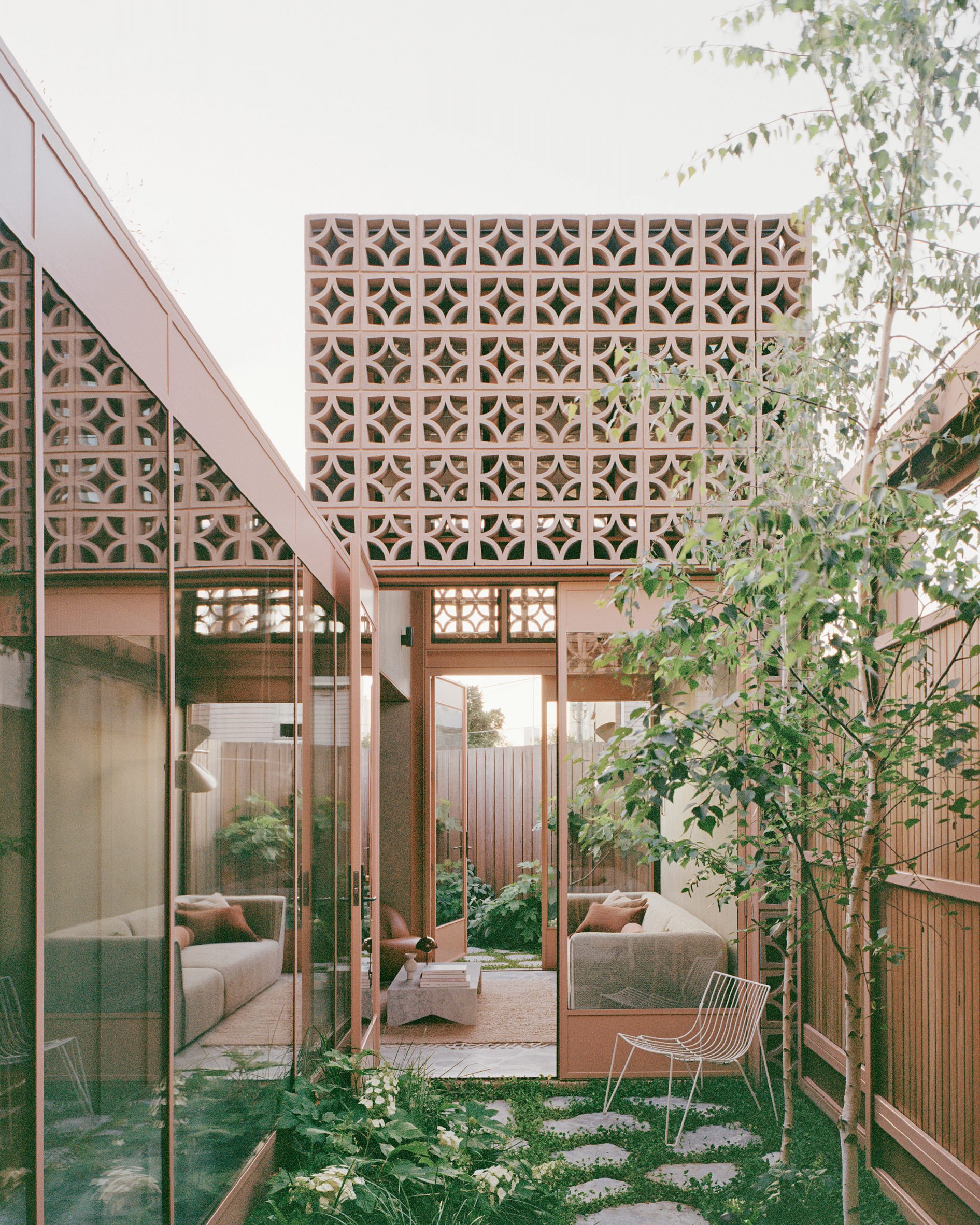
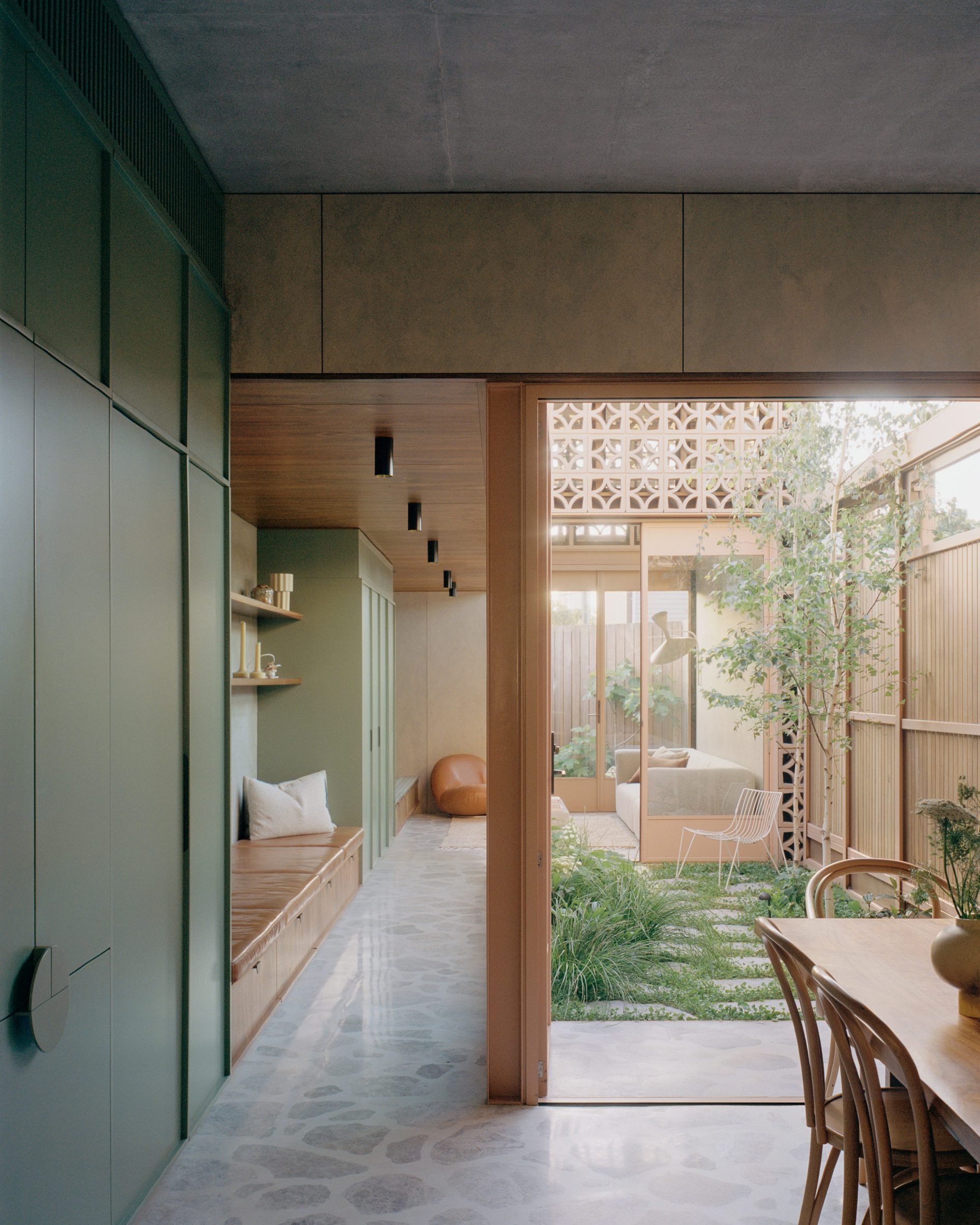
Architecture practice Studio Bright used patterned breeze blocks to wrap Garden Tower House, an extension in Australia, which peeks out from behind the restored frontage of a workers' cottage. Located in the Melbourne suburb of Cremorne, the project was a response to "unsustainable sprawl" in the area, looking to maximise the awkward, narrow site of the existing home rather than expanding outwards.

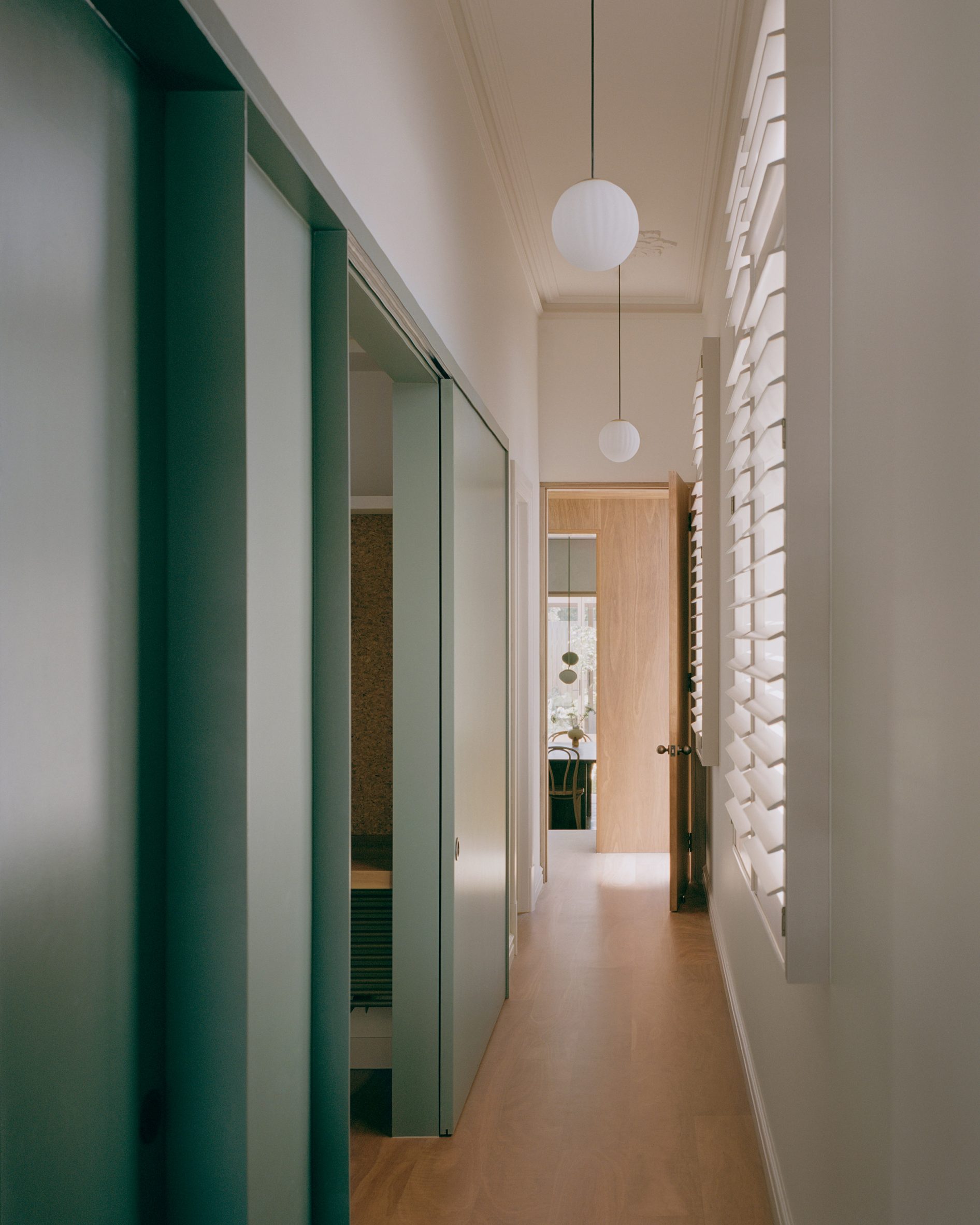
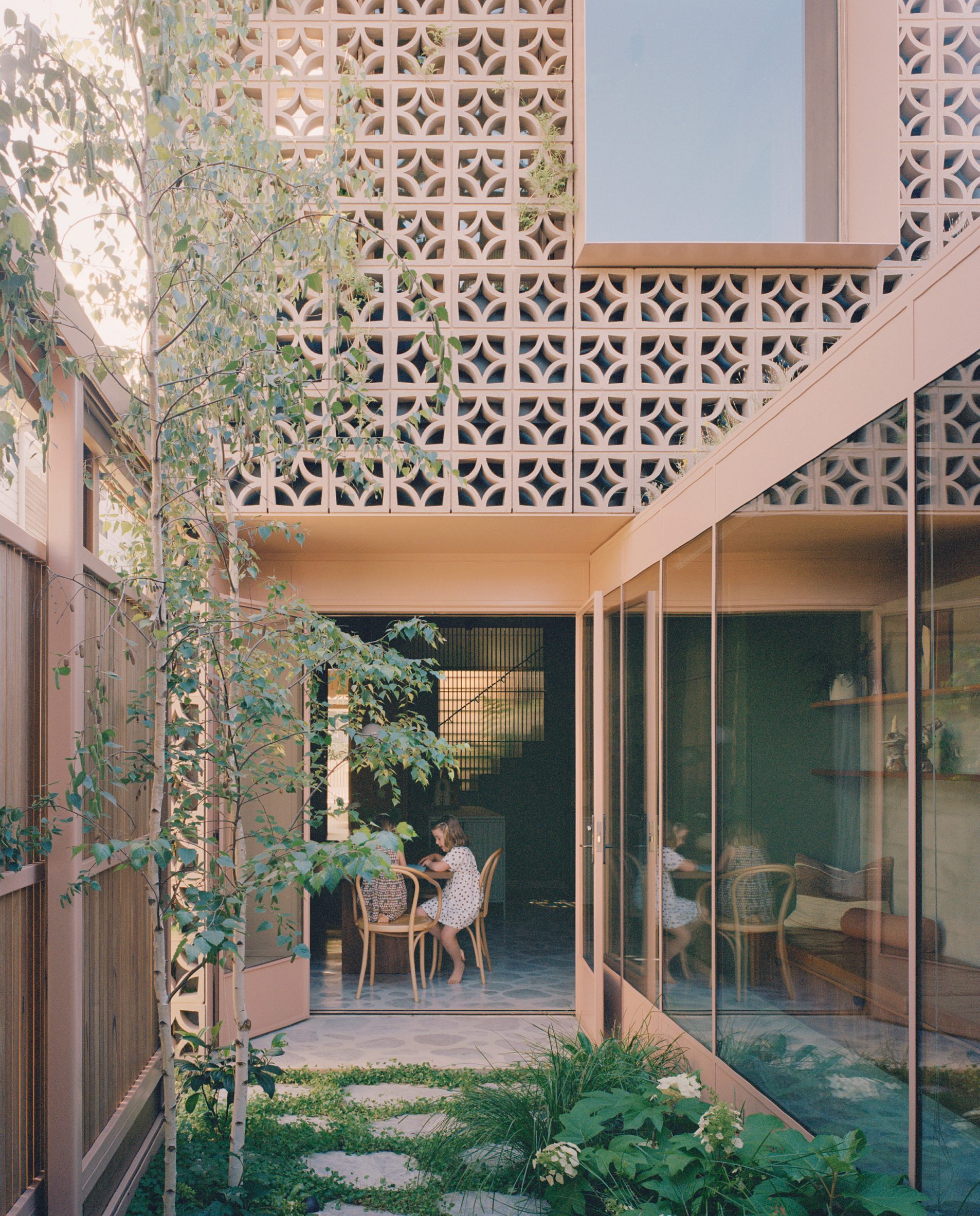
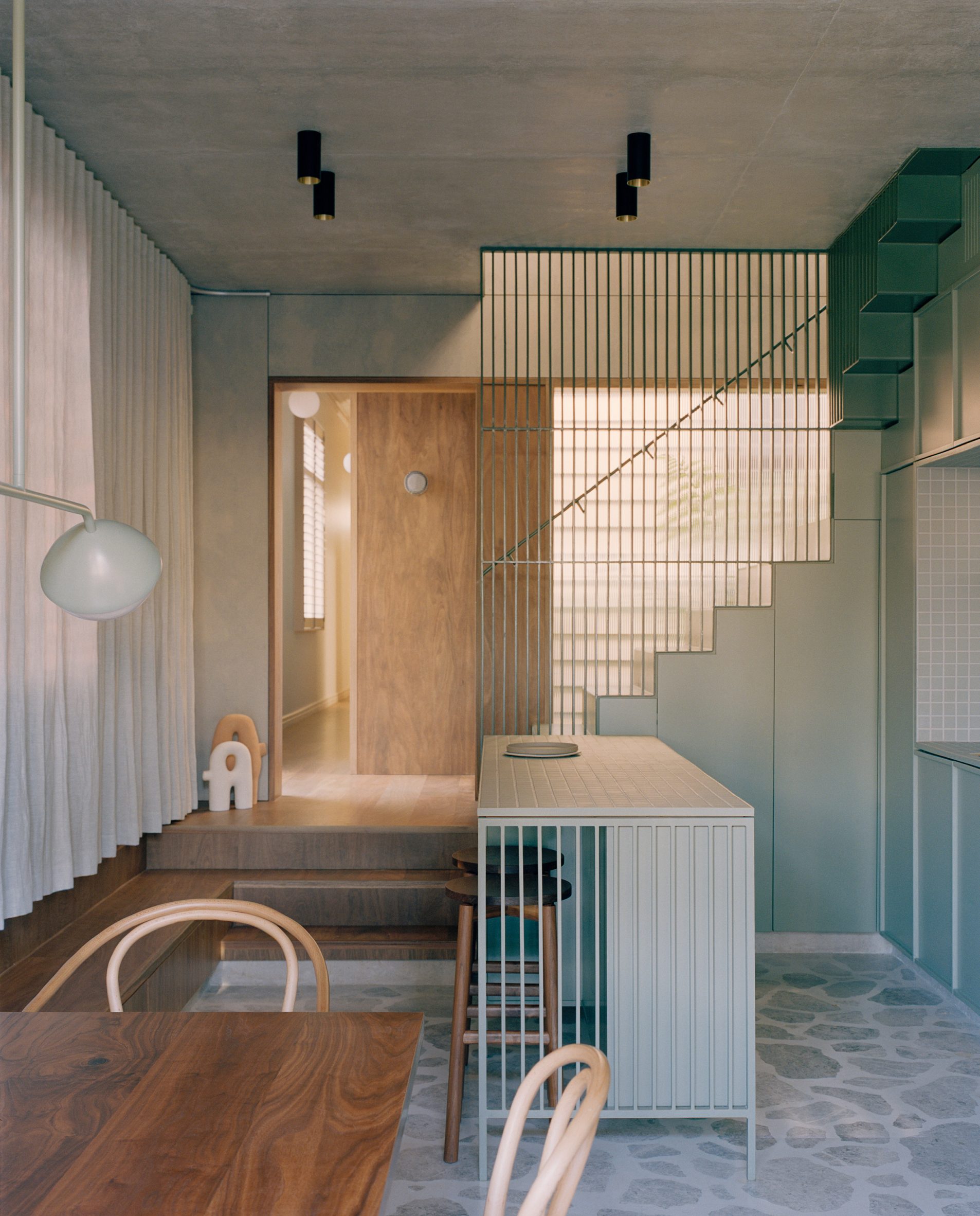
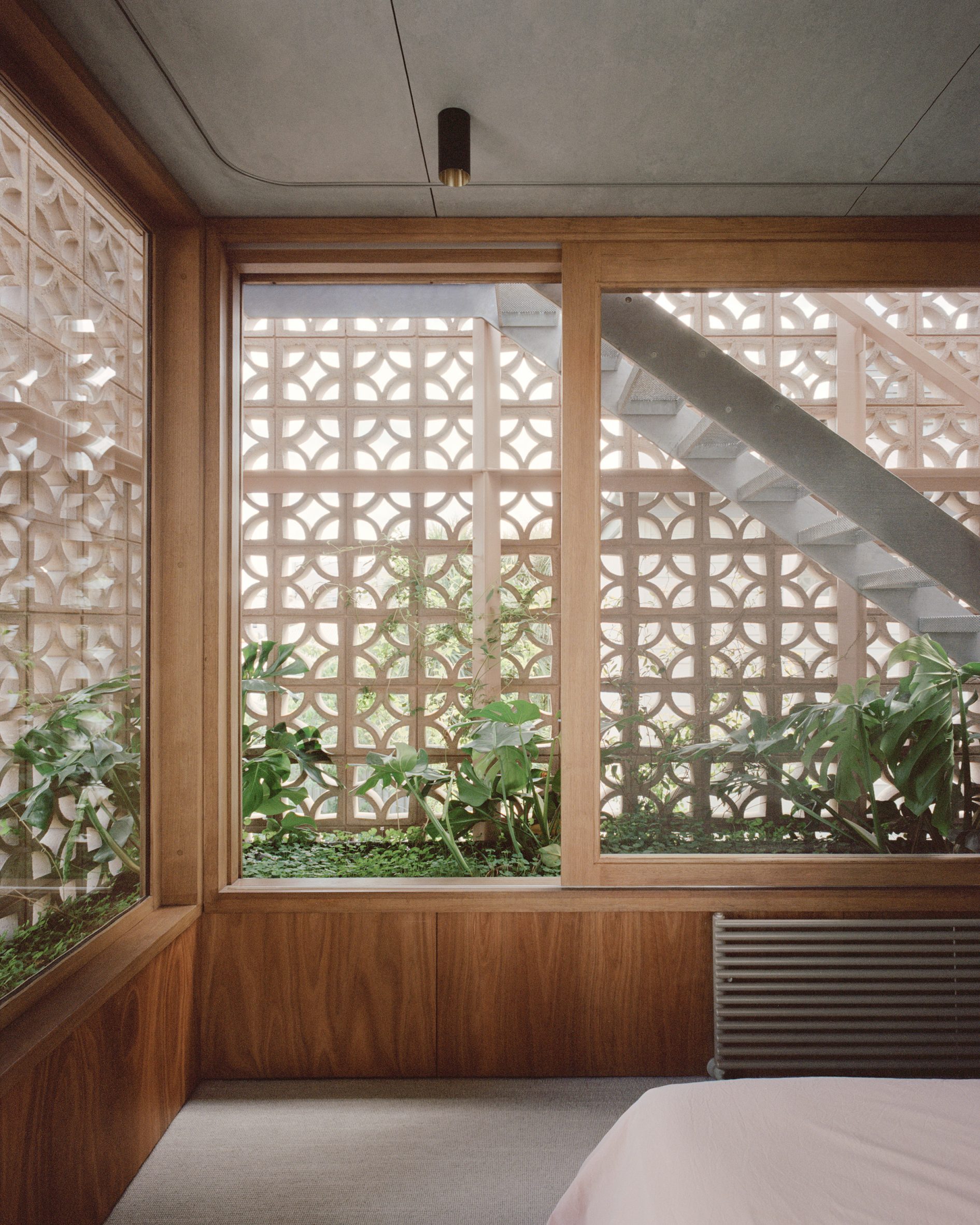
"The challenge in Australia for our cities to become more sustainable is that they need to work harder for us – we need to increase the density," said Studio Bright director Melissa Bright. "We don't see this as a negative; we wonder how we might live closer together and get more from it," she told Dezeen.
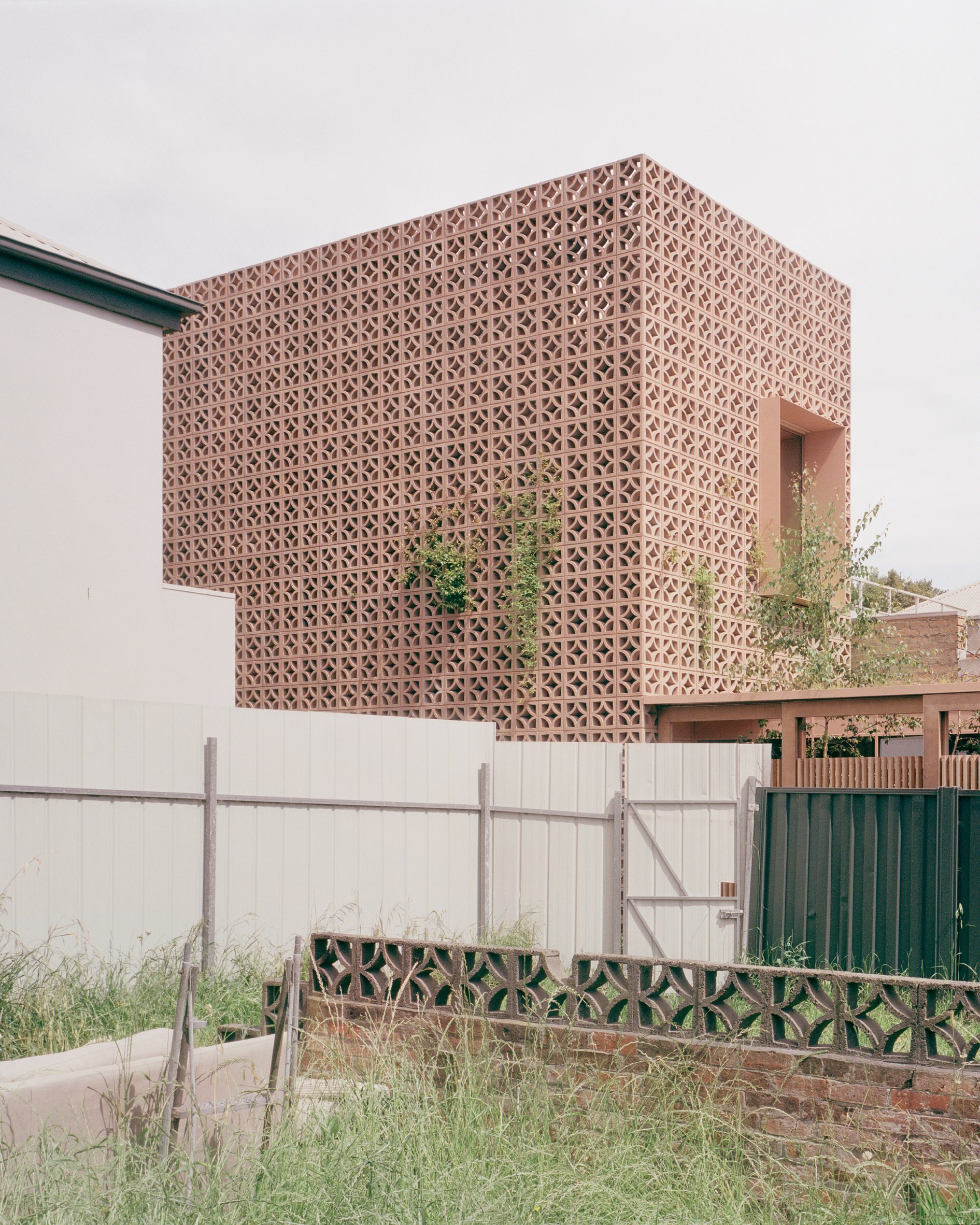
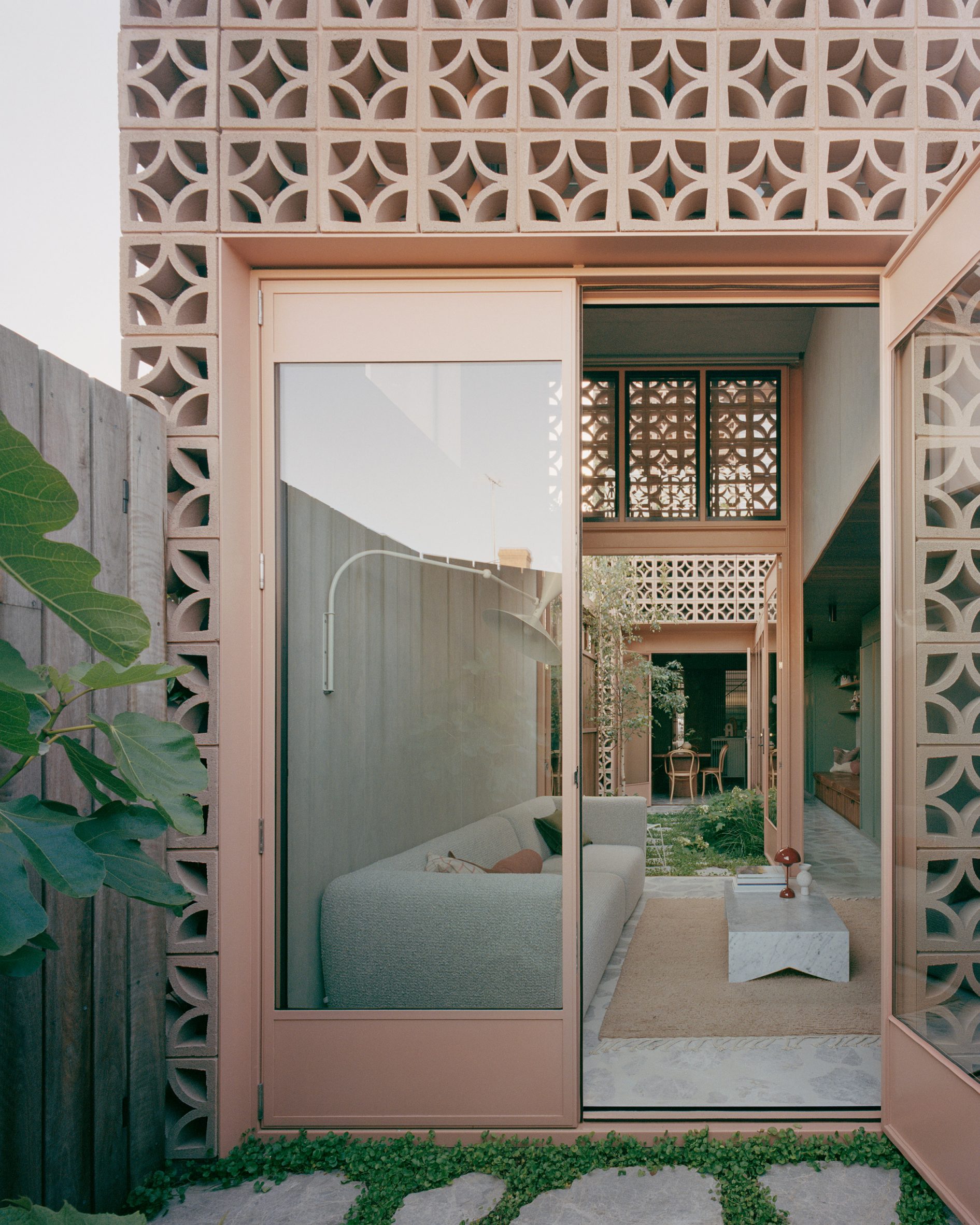
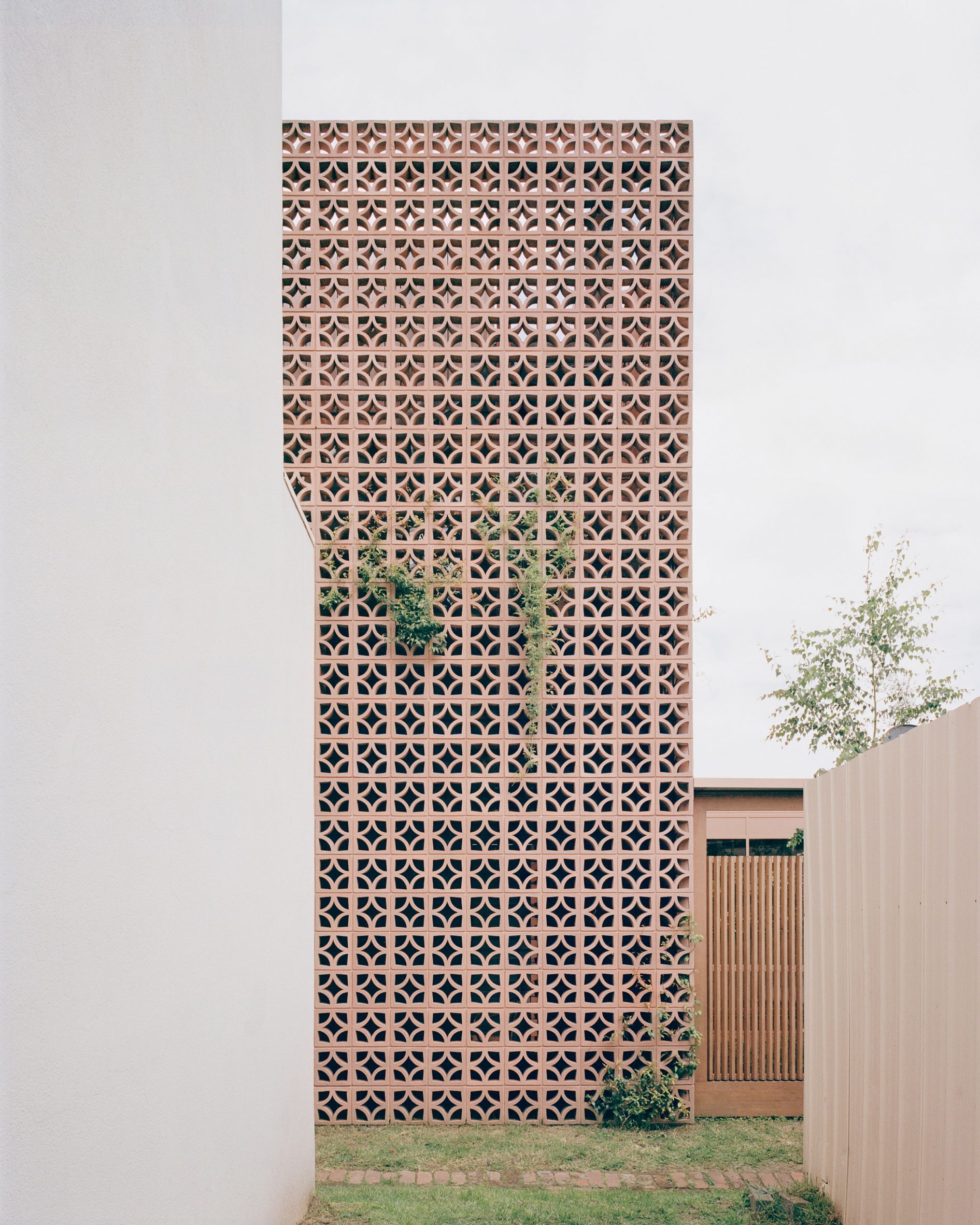
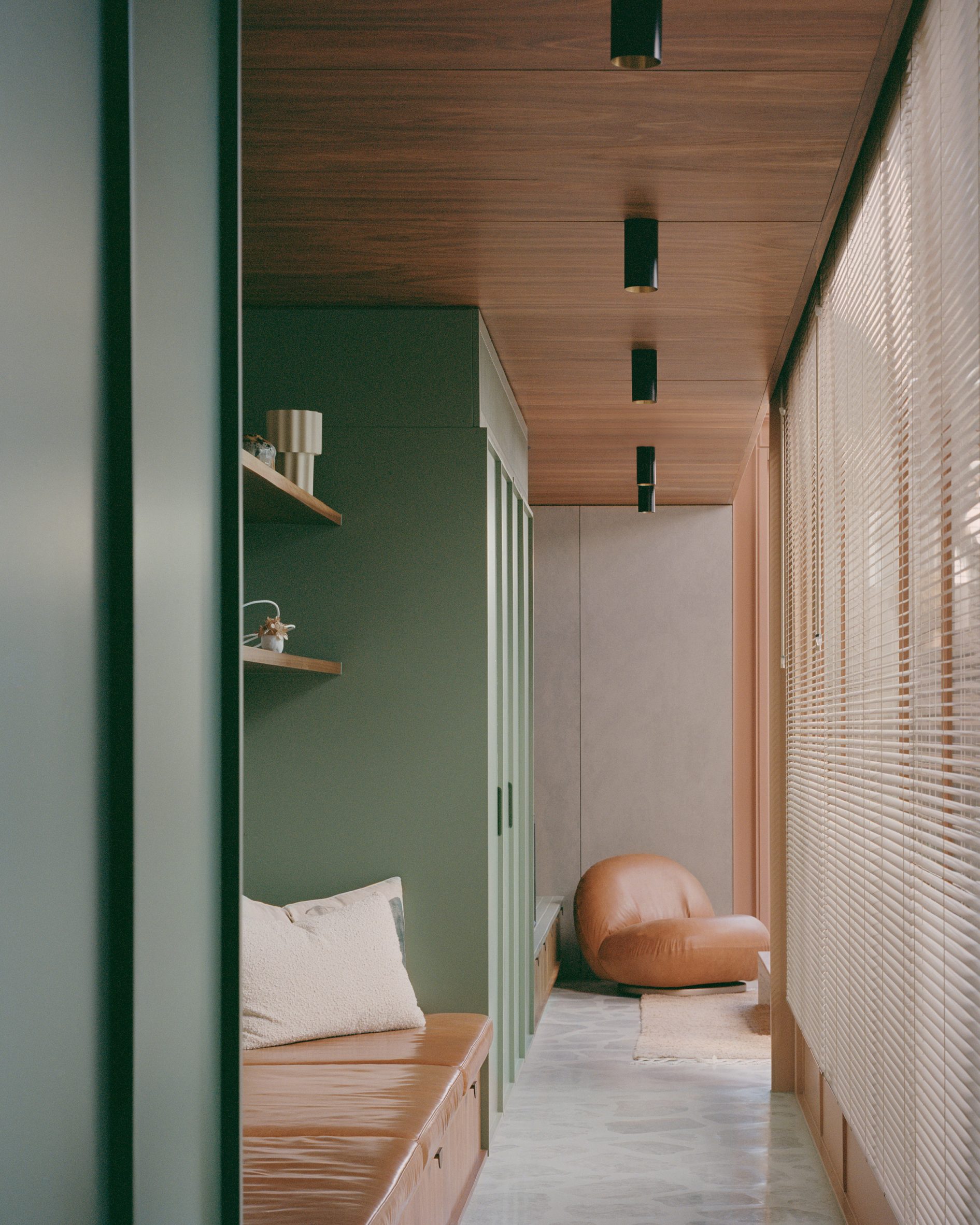
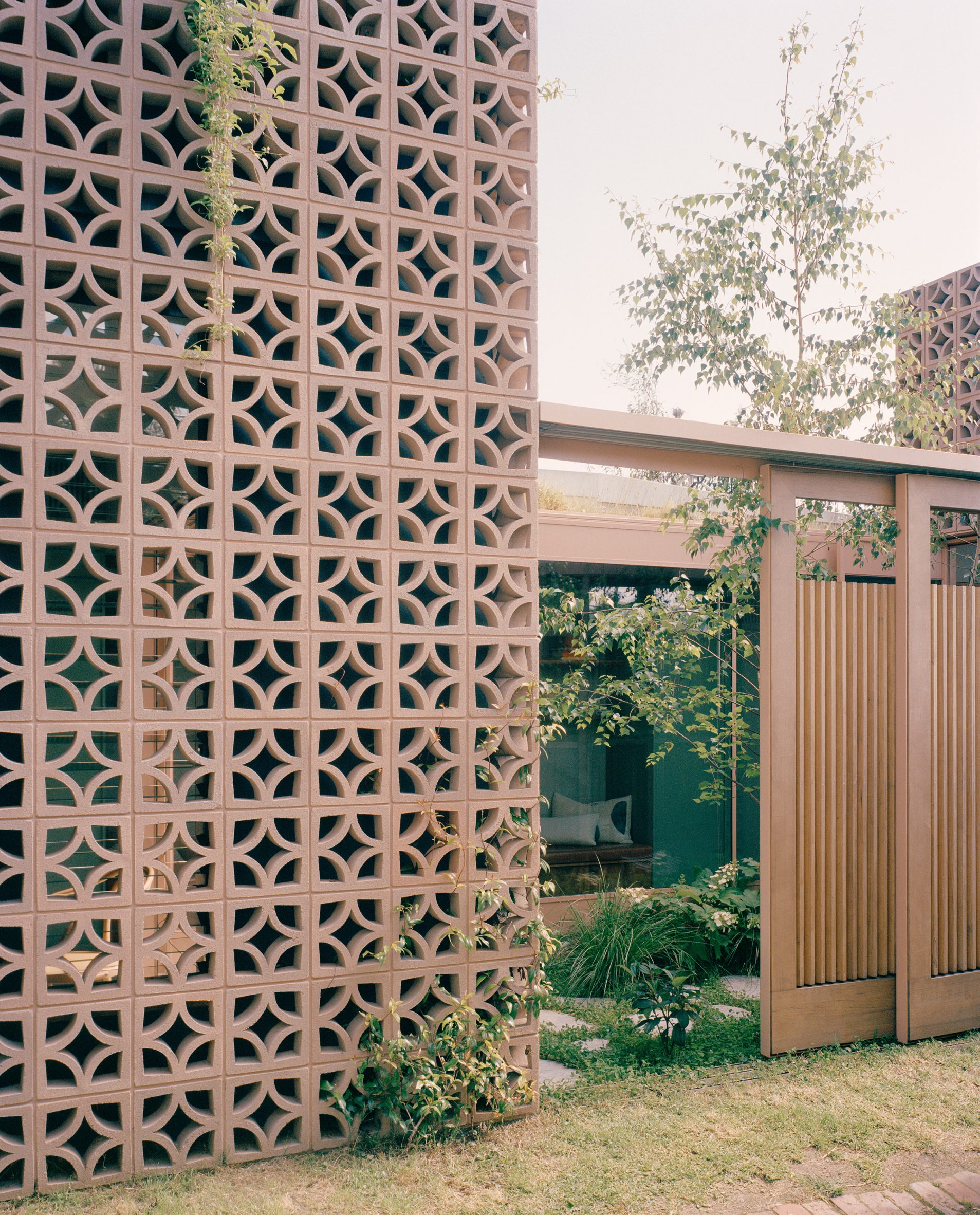
"Often disused laneways are seen as security problems – we see them as an opportunity, for a borrowed backyard, for a place to connect with neighbours and for a new address and frontage," added Bright. "Even these small spaces can be seen as small urban 'places' that we can enliven with activation and care."
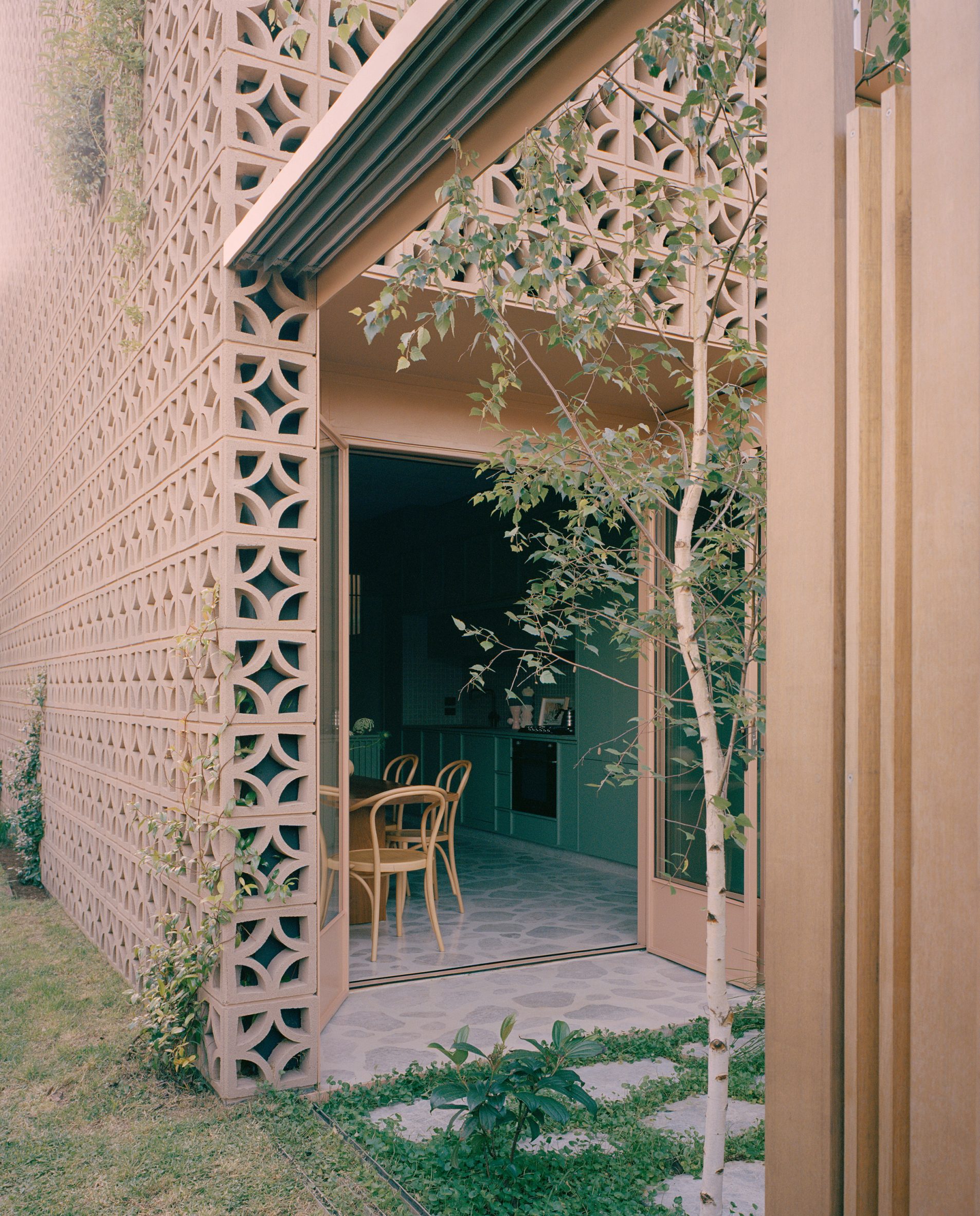
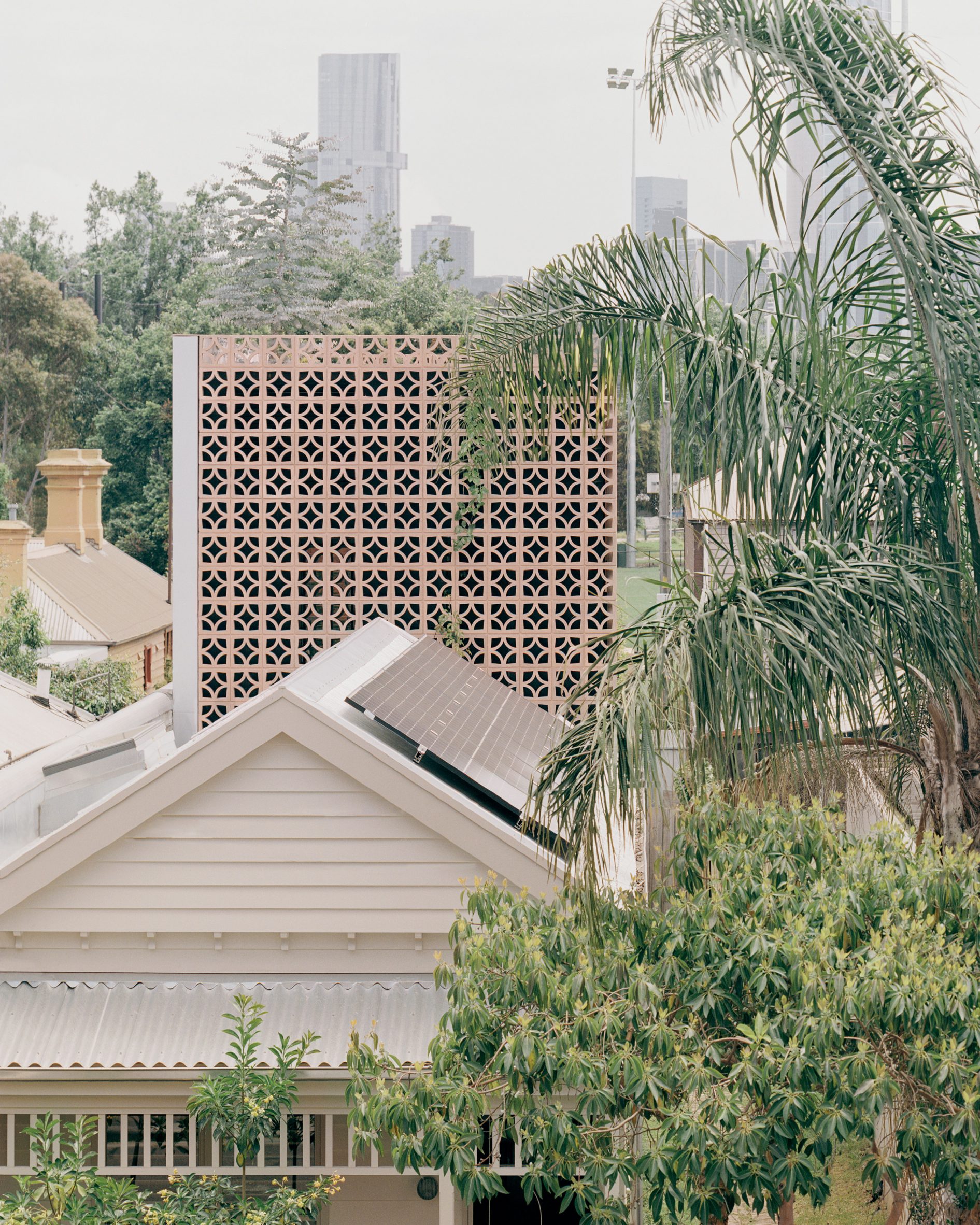

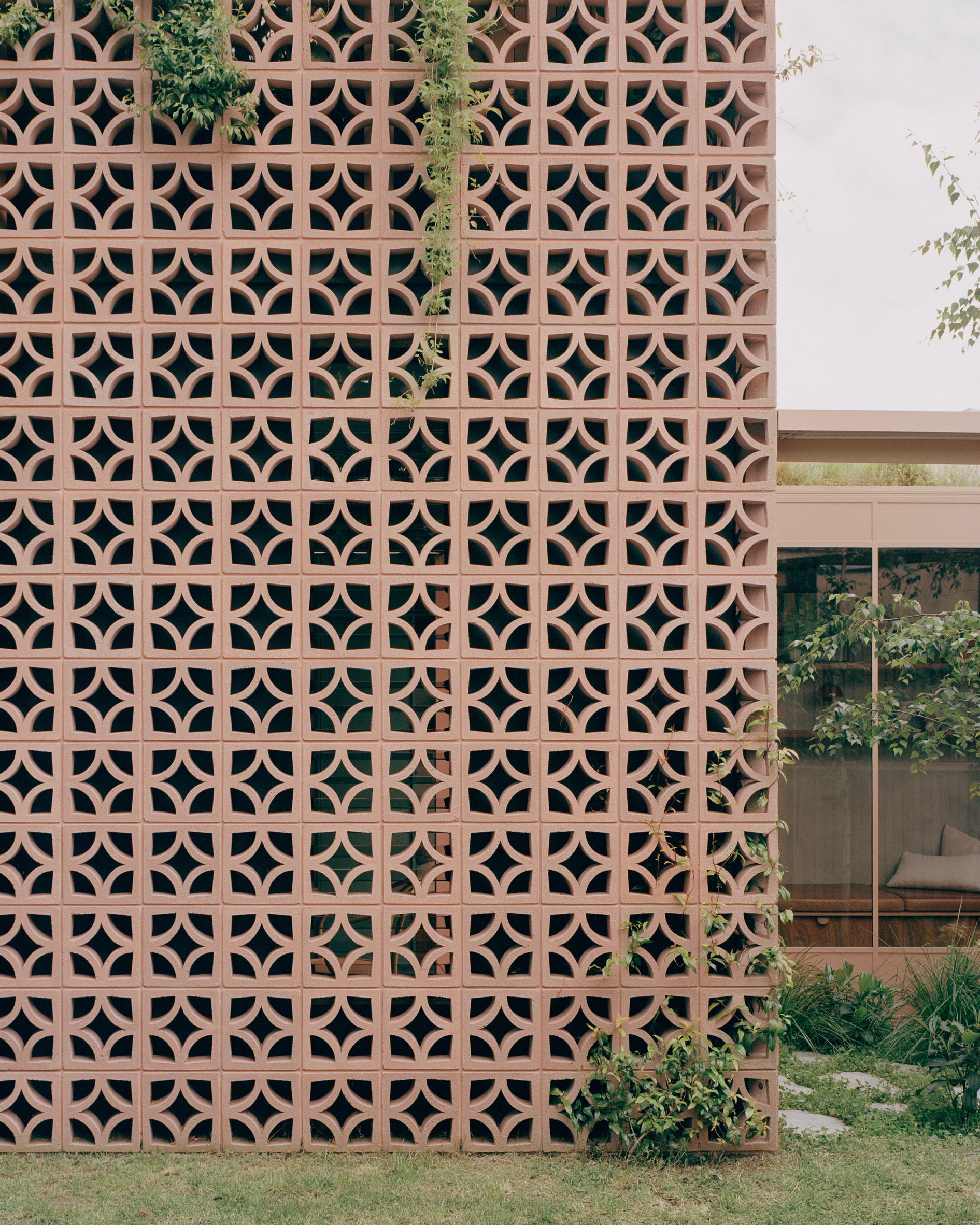
The extension comprises two blocks that step down slightly at the rear of the existing home, containing a large living, dining and kitchen space that wraps a central garden. In the larger "tower" volume, an upper storey contains a bedroom with a large, deep-set window overlooking the central garden.
snip

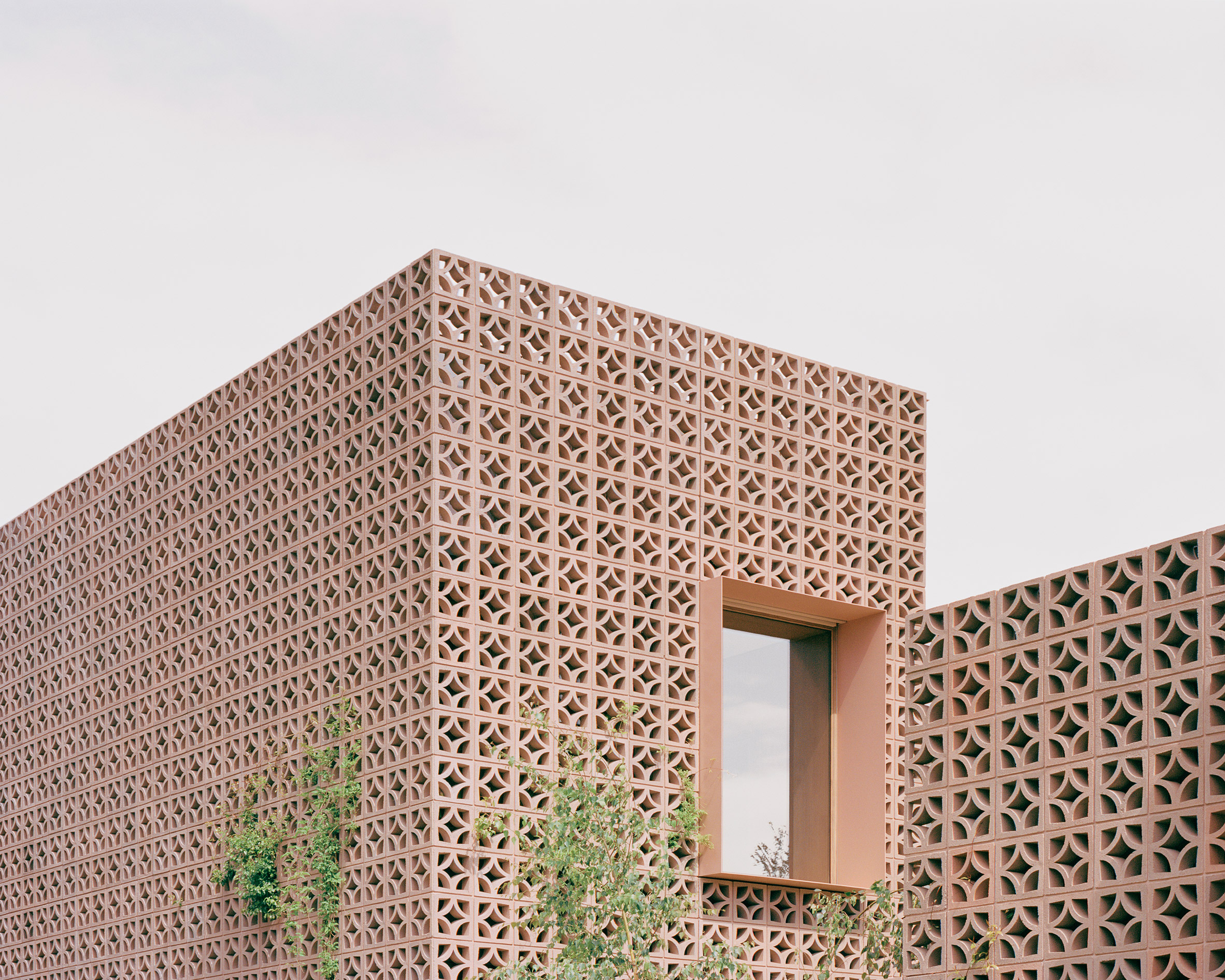
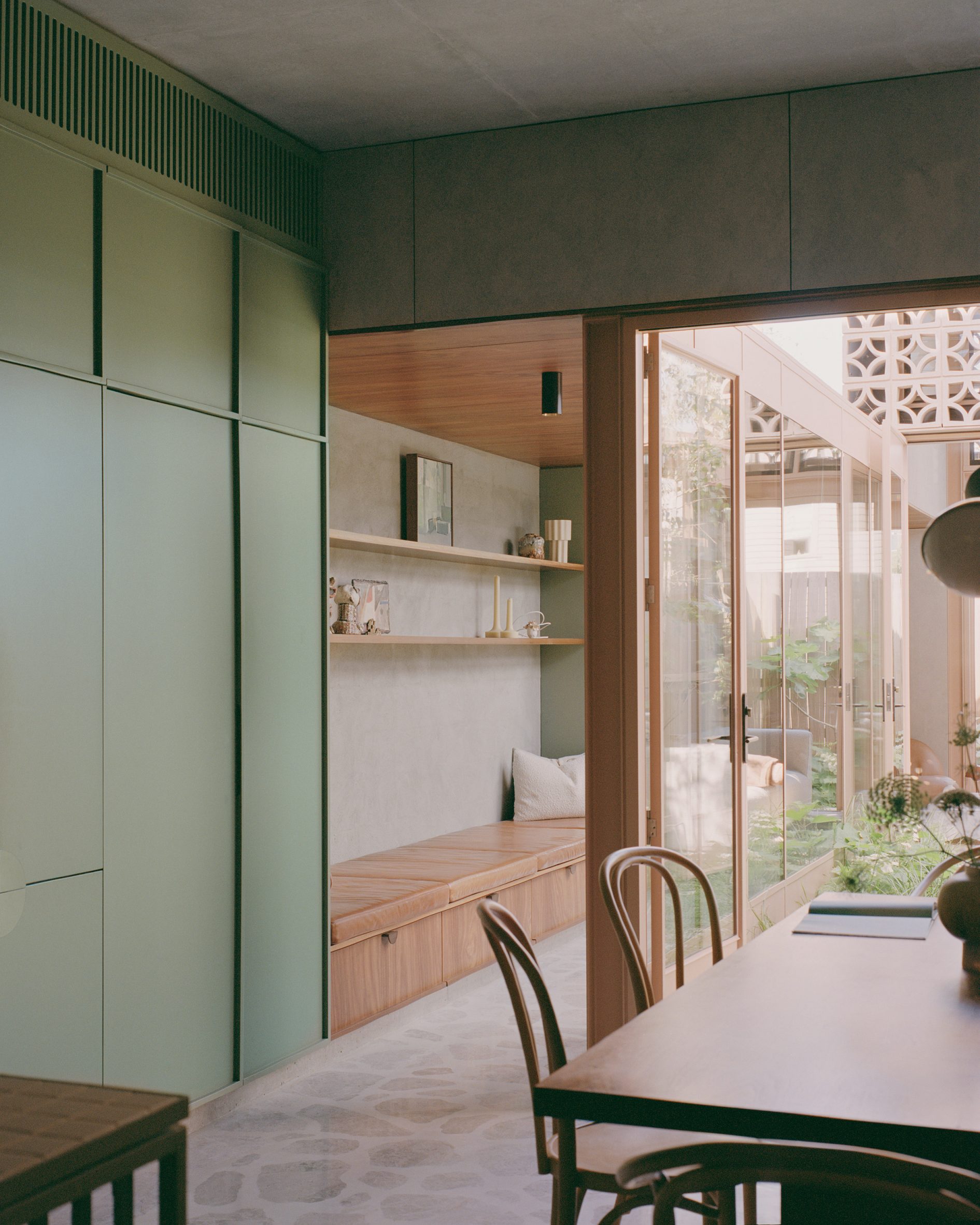
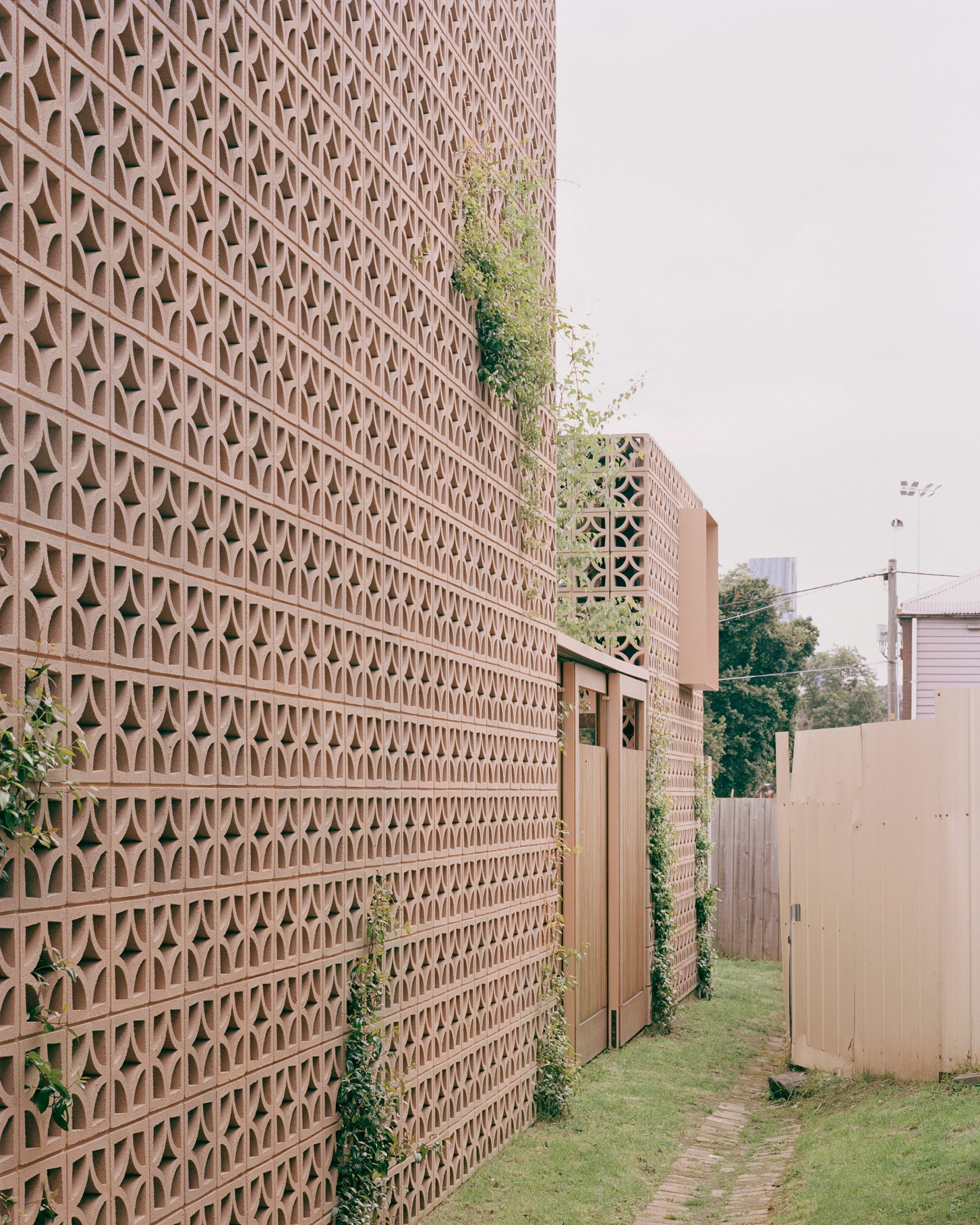
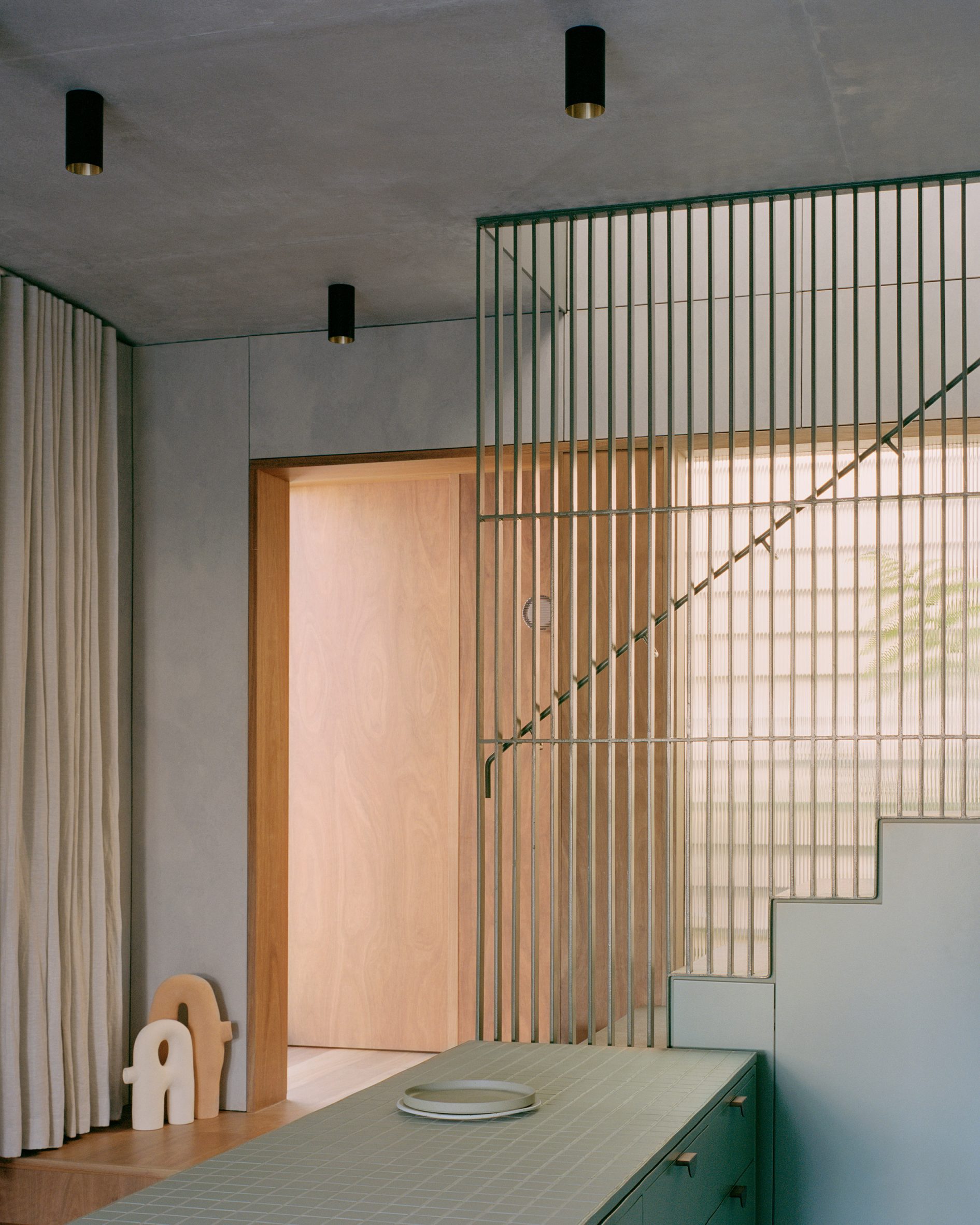
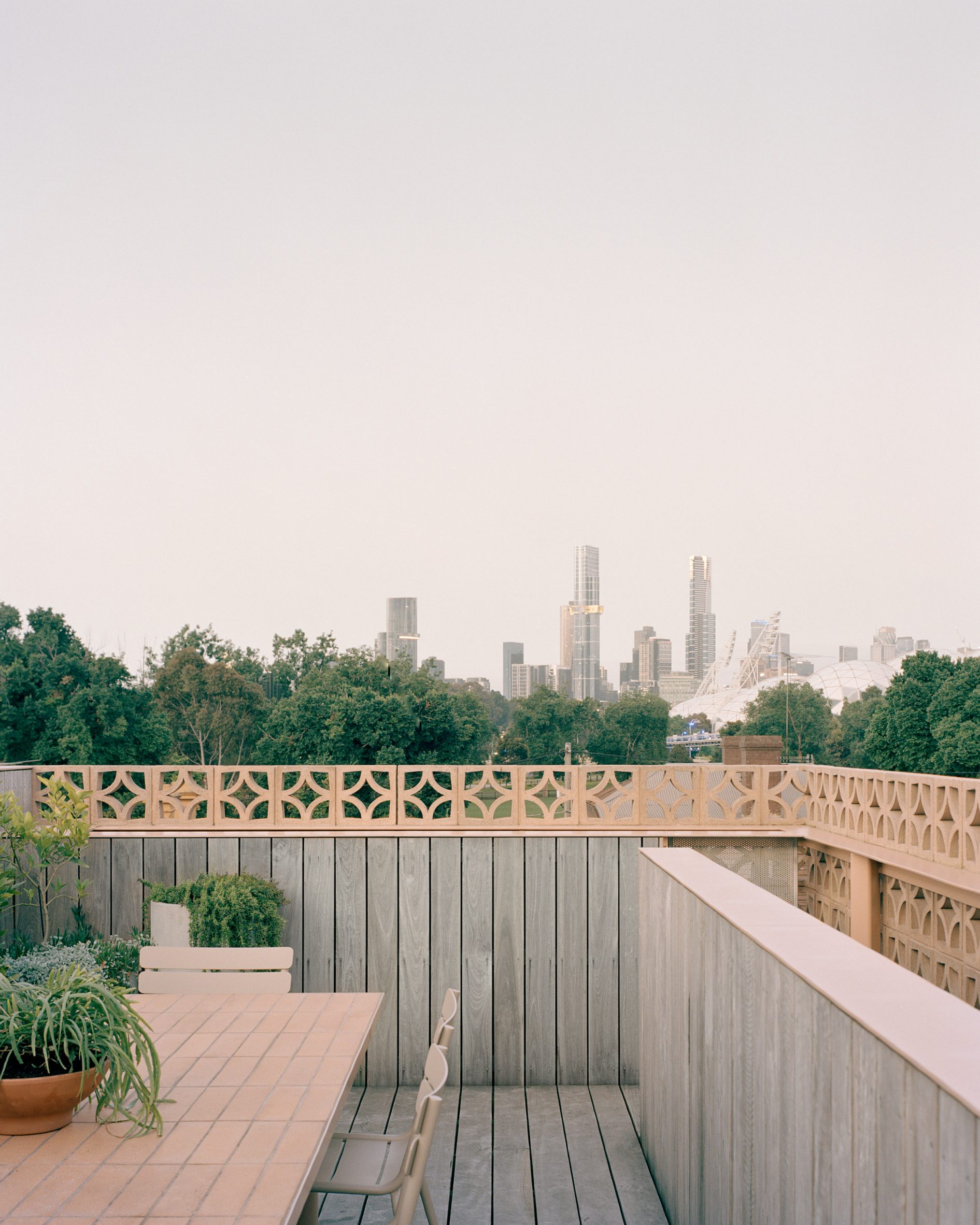
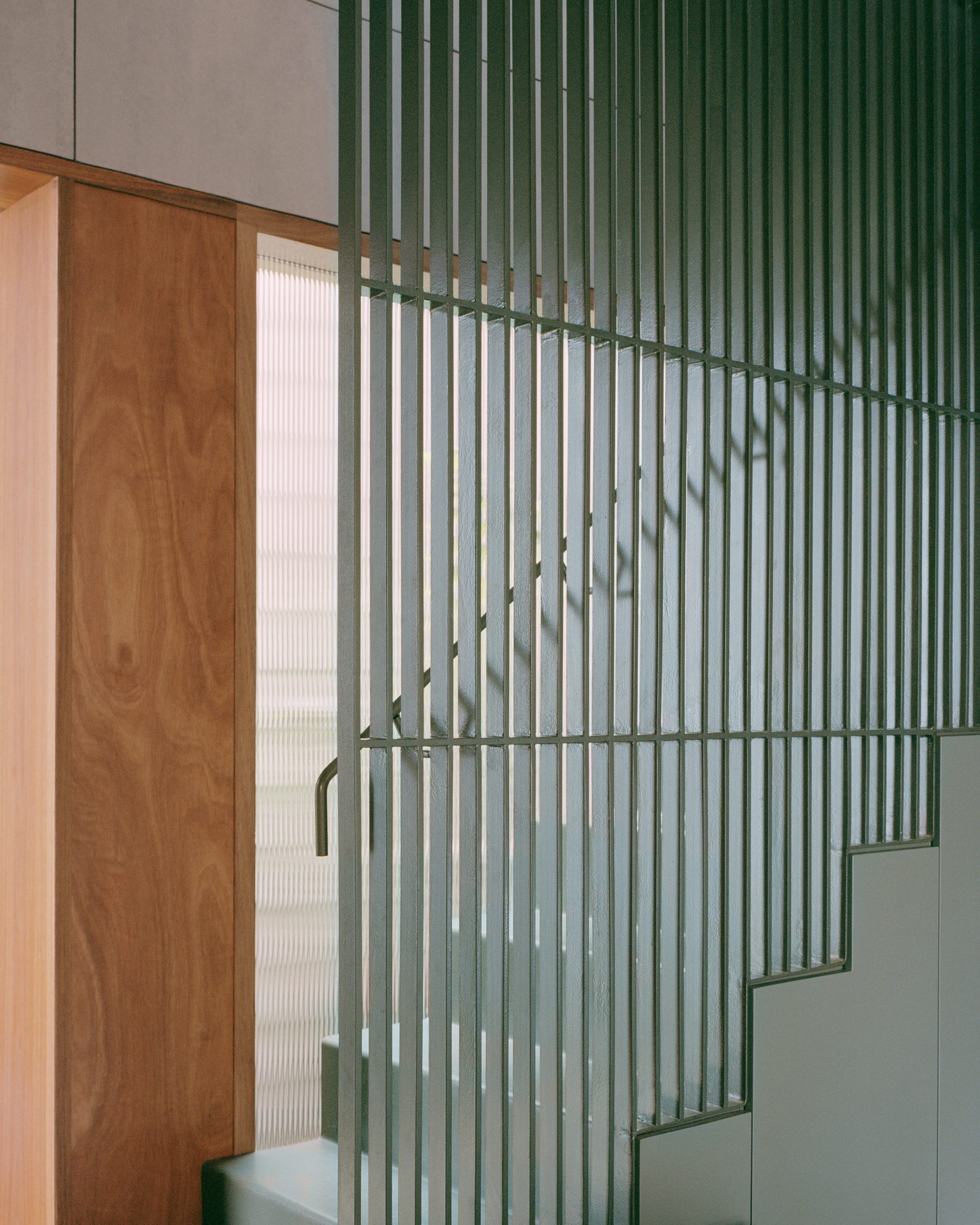
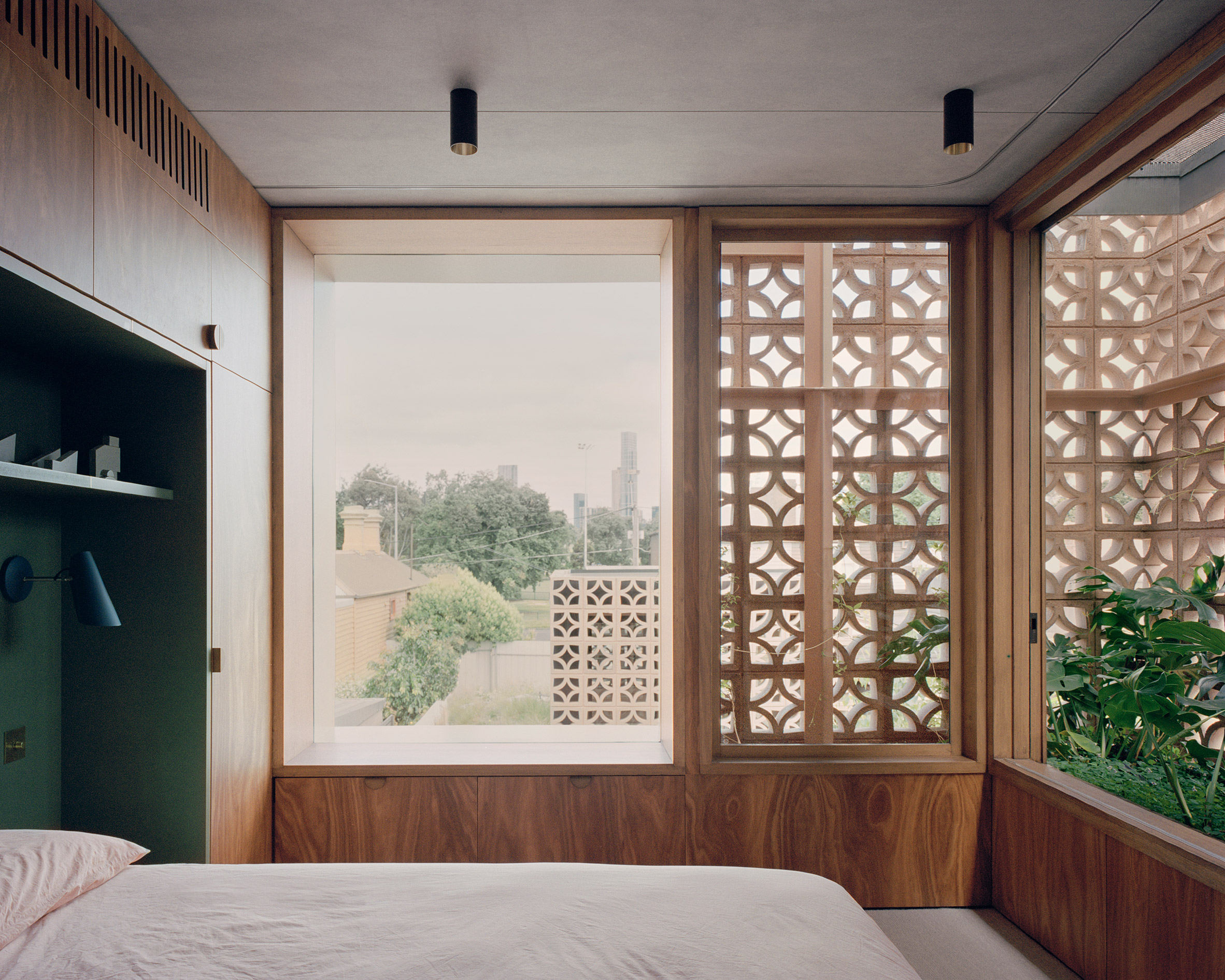
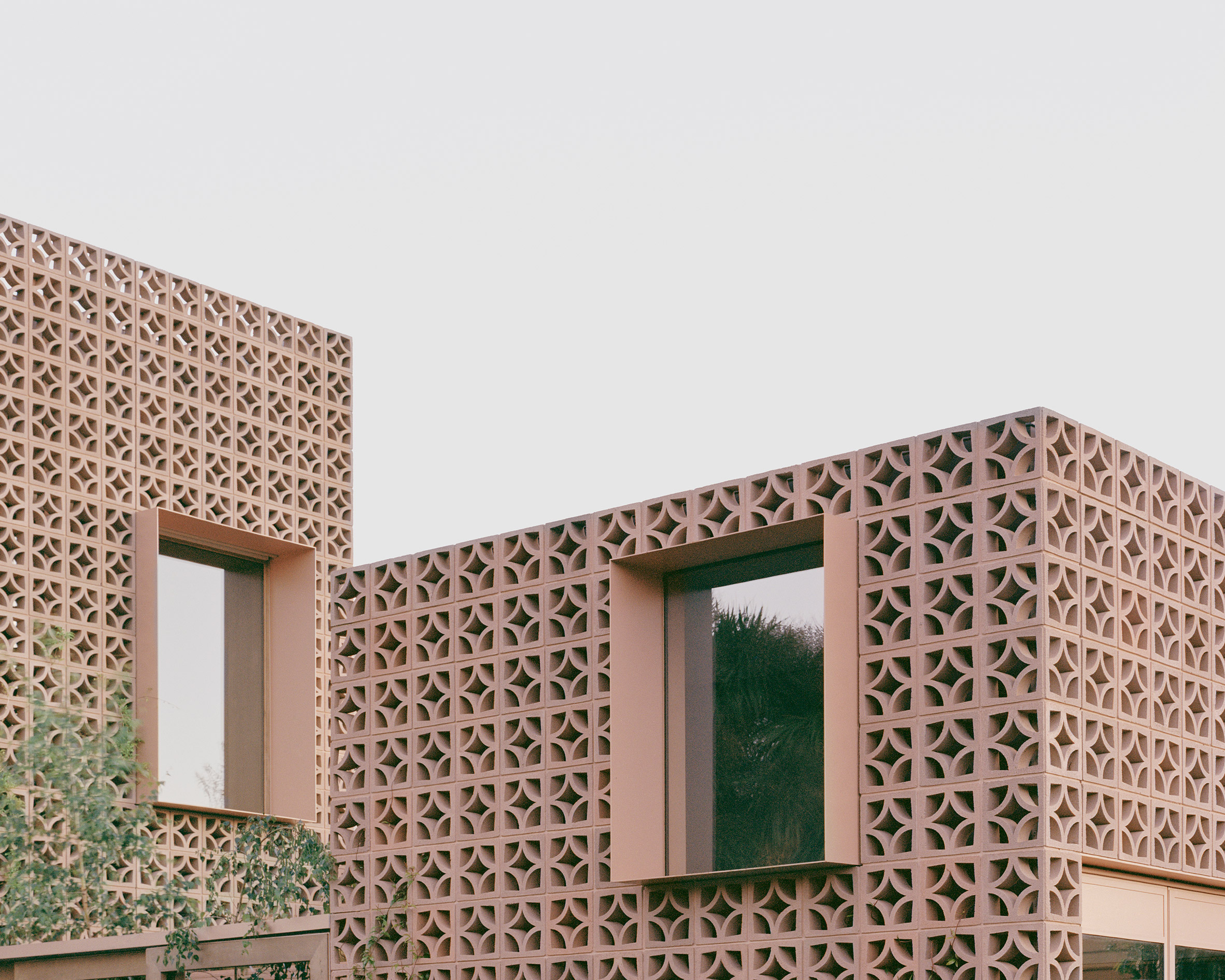
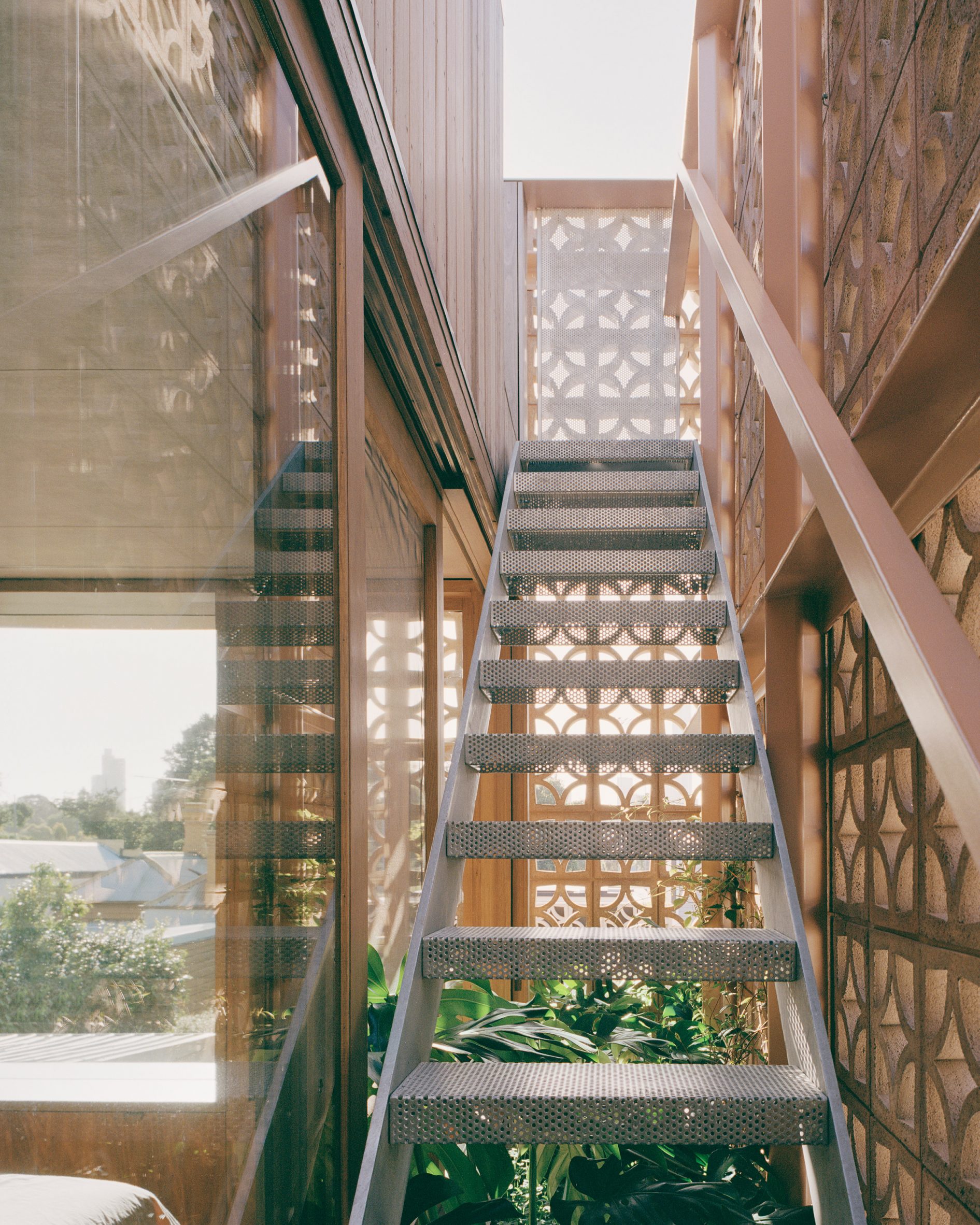
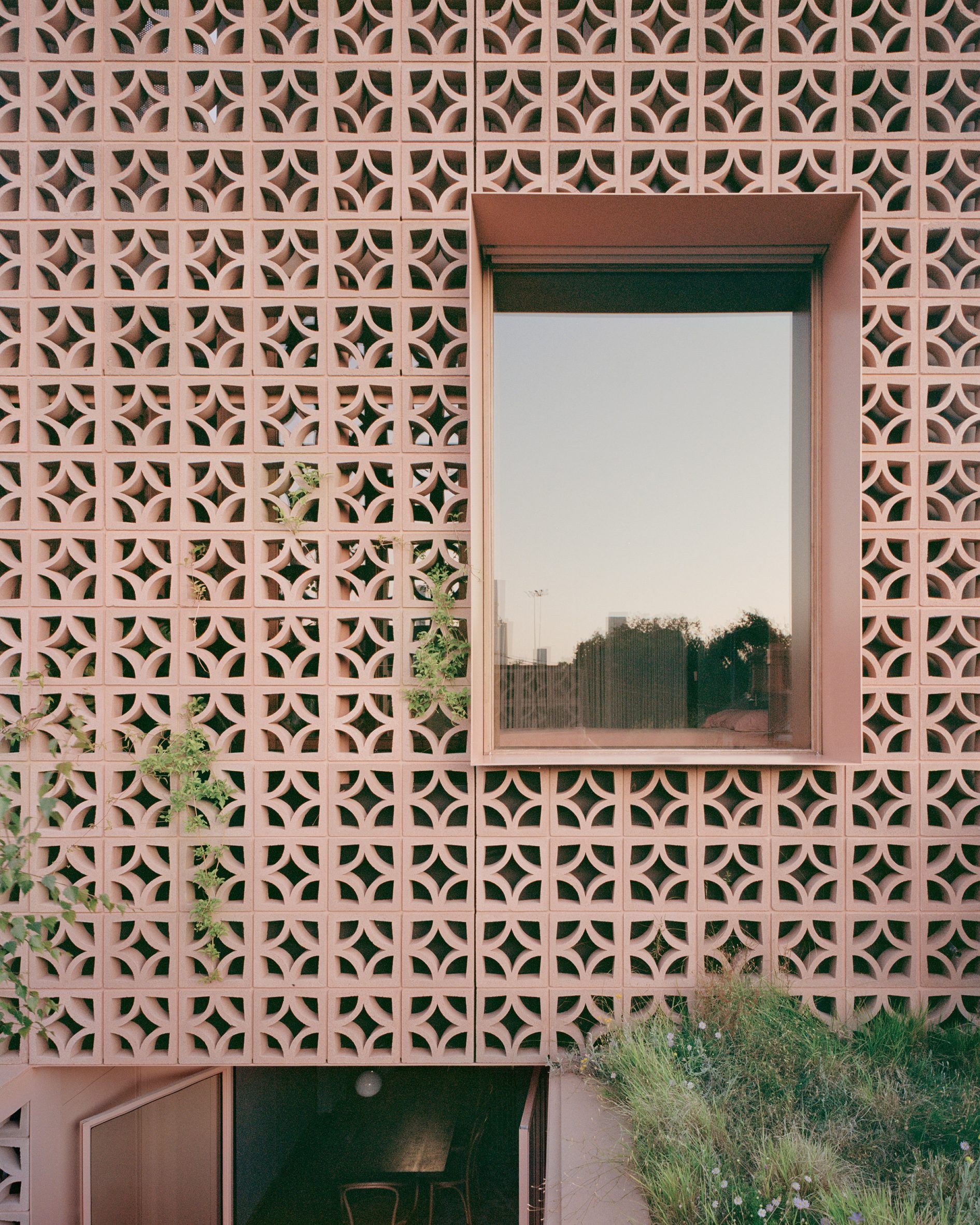
Studio Bright wraps extension in Melbourne, Australia with pale pink breeze blocks
https://www.dezeen.com/2023/09/24/studio-bright-garden-tower-house-extension-australia/



Architecture practice Studio Bright used patterned breeze blocks to wrap Garden Tower House, an extension in Australia, which peeks out from behind the restored frontage of a workers' cottage. Located in the Melbourne suburb of Cremorne, the project was a response to "unsustainable sprawl" in the area, looking to maximise the awkward, narrow site of the existing home rather than expanding outwards.





"The challenge in Australia for our cities to become more sustainable is that they need to work harder for us – we need to increase the density," said Studio Bright director Melissa Bright. "We don't see this as a negative; we wonder how we might live closer together and get more from it," she told Dezeen.





"Often disused laneways are seen as security problems – we see them as an opportunity, for a borrowed backyard, for a place to connect with neighbours and for a new address and frontage," added Bright. "Even these small spaces can be seen as small urban 'places' that we can enliven with activation and care."




The extension comprises two blocks that step down slightly at the rear of the existing home, containing a large living, dining and kitchen space that wraps a central garden. In the larger "tower" volume, an upper storey contains a bedroom with a large, deep-set window overlooking the central garden.
snip











September 28, 2023
https://www.axios.com/local/nashville/2023/09/26/tennessee-group-consider-rejecting-federal-education-funding

Why it matters:
Tennessee would be the first state to turn down federal education funding. The new working group of 10 lawmakers could move that concept closer to reality. The group will consider the regulations and requirements that come along with the federal funding, and if the state could step in and fill that funding gap itself, according to a joint announcement from Sexton and Lt. Gov. Randy McNally (R-Oak Ridge).
What he's saying:
"Any time the federal government sends money, there are always strings attached to those dollars, and there is always a possibility that it opens the state up to other regulations or restrictions," Sexton said in a statement. "This working group will help provide a clearer picture of how much autonomy Tennessee truly has in educating our students."
The other side:
"Federal funds are crucial in supporting students with special needs, English language learners, and those from low-income families," state Sen. Raumesh Akbari (D-Memphis), who is one of the Democrats on the panel, said in a statement. "The harsh consequences of rejecting this $1.8 billion in funding cannot be overstated," she said. "Through this committee, I will advocate that Tennessee keep accepting these necessary funds."
Of note:
The group includes eight Republicans and two Democrats. They have not set a time for the first meeting.
snip
Tennessee Republican leaders form group to consider rejecting federal education funding
Tennessee's top Republican lawmakers are forming a group to consider rejecting federal education funding for the state's K-12 schools.https://www.axios.com/local/nashville/2023/09/26/tennessee-group-consider-rejecting-federal-education-funding
Flashback:
House Speaker Cameron Sexton (R-Crossville) proposed turning down $1.8 billion in federal money earlier this year.
House Speaker Cameron Sexton (R-Crossville) proposed turning down $1.8 billion in federal money earlier this year.

Why it matters:
Tennessee would be the first state to turn down federal education funding. The new working group of 10 lawmakers could move that concept closer to reality. The group will consider the regulations and requirements that come along with the federal funding, and if the state could step in and fill that funding gap itself, according to a joint announcement from Sexton and Lt. Gov. Randy McNally (R-Oak Ridge).
What he's saying:
"Any time the federal government sends money, there are always strings attached to those dollars, and there is always a possibility that it opens the state up to other regulations or restrictions," Sexton said in a statement. "This working group will help provide a clearer picture of how much autonomy Tennessee truly has in educating our students."
The other side:
"Federal funds are crucial in supporting students with special needs, English language learners, and those from low-income families," state Sen. Raumesh Akbari (D-Memphis), who is one of the Democrats on the panel, said in a statement. "The harsh consequences of rejecting this $1.8 billion in funding cannot be overstated," she said. "Through this committee, I will advocate that Tennessee keep accepting these necessary funds."
Of note:
The group includes eight Republicans and two Democrats. They have not set a time for the first meeting.
snip
September 27, 2023

https://prospect.org/politics/2023-09-27-end-government-shutdowns-forever/

A sign is posted on a barricade in front of the closed Lincoln Memorial in Washington, October 1, 2013, during a previous federal government shutdown.
As of Wednesday, there are just four days before the government shuts down, and it’s looking quite unlikely that it will be avoided. The main problem is the House Freedom Caucus, which has flatly refused to abide by the agreement struck between House Republicans and President Biden back during the debt ceiling negotiations, where Republicans extracted some modest budget cuts (too modest for the hard-liners) in return for not blowing up the global financial system. The Senate is reportedly preparing its own budget package to pressure Speaker of the House Kevin McCarthy to pass it with mostly Democratic votes, but there is little sign McCarthy will agree to that yet, because he’s afraid of crossing the hard-liners, who can then call for a vote to remove McCarthy from his job.
At time of writing, the Freedom Caucus can’t even agree on what hostage they want, though various proposals to slash vital government services (like cutting aid to low-income public schools by 80 percent) have been mooted. One gets the impression that they simply want a shutdown for its own sake—egged on by Donald Trump, who recently demanded, “UNLESS YOU GET EVERYTHING, SHUT IT DOWN!” in a post online. That includes stopping “the Weaponization of ‘Justice,’” which obviously refers to Trump’s various prosecutions for attempting to overthrow the government and other crimes. To onlookers, this is no doubt maddening.
First of all, there’s a solution that all but a small faction of one party in one chamber of Congress would agree to—so how isn’t that being done? And how is it possible that such a rich country can be governed like this? The truth is, most of them aren’t—and that includes the U.S. itself before 1980. It would be quite simple to return to the previous system. A government shutdown is not possible in other rich countries. As Rick Noack details at The Washington Post, in Westminster-style systems like the U.K. or Australia, if the government fails to pass a budget, then typically it must resign and new elections are triggered. Or in Germany, failure means the government budget runs on autopilot. Amusingly, Belgium also has a German-style system, and when it had no government at all for almost two years in 2010-2011, the autopilot budget was quite helpful because inaction meant avoiding much of the brutal austerity then being imposed across the continent.

So how do we fix the American system? We just have to return to procedures that were in place as recently as the 1970s. The legal question here centers on the 1870 Antideficiency Act. As Andrew Cohen writes at The Atlantic, back in the 19th century, presidents would commonly extort money out of Congress by signing contracts without having an explicit appropriation, and then daring legislators to break the government’s word. The Antideficiency Act forbade that kind of trickery. But it was less specific about what should happen if Congress simply failed to pass a budget at all (which likely didn’t even occur to them).
snip
There's an Easy Way to End Government Shutdowns Forever

https://prospect.org/politics/2023-09-27-end-government-shutdowns-forever/

A sign is posted on a barricade in front of the closed Lincoln Memorial in Washington, October 1, 2013, during a previous federal government shutdown.
As of Wednesday, there are just four days before the government shuts down, and it’s looking quite unlikely that it will be avoided. The main problem is the House Freedom Caucus, which has flatly refused to abide by the agreement struck between House Republicans and President Biden back during the debt ceiling negotiations, where Republicans extracted some modest budget cuts (too modest for the hard-liners) in return for not blowing up the global financial system. The Senate is reportedly preparing its own budget package to pressure Speaker of the House Kevin McCarthy to pass it with mostly Democratic votes, but there is little sign McCarthy will agree to that yet, because he’s afraid of crossing the hard-liners, who can then call for a vote to remove McCarthy from his job.
At time of writing, the Freedom Caucus can’t even agree on what hostage they want, though various proposals to slash vital government services (like cutting aid to low-income public schools by 80 percent) have been mooted. One gets the impression that they simply want a shutdown for its own sake—egged on by Donald Trump, who recently demanded, “UNLESS YOU GET EVERYTHING, SHUT IT DOWN!” in a post online. That includes stopping “the Weaponization of ‘Justice,’” which obviously refers to Trump’s various prosecutions for attempting to overthrow the government and other crimes. To onlookers, this is no doubt maddening.
First of all, there’s a solution that all but a small faction of one party in one chamber of Congress would agree to—so how isn’t that being done? And how is it possible that such a rich country can be governed like this? The truth is, most of them aren’t—and that includes the U.S. itself before 1980. It would be quite simple to return to the previous system. A government shutdown is not possible in other rich countries. As Rick Noack details at The Washington Post, in Westminster-style systems like the U.K. or Australia, if the government fails to pass a budget, then typically it must resign and new elections are triggered. Or in Germany, failure means the government budget runs on autopilot. Amusingly, Belgium also has a German-style system, and when it had no government at all for almost two years in 2010-2011, the autopilot budget was quite helpful because inaction meant avoiding much of the brutal austerity then being imposed across the continent.

So how do we fix the American system? We just have to return to procedures that were in place as recently as the 1970s. The legal question here centers on the 1870 Antideficiency Act. As Andrew Cohen writes at The Atlantic, back in the 19th century, presidents would commonly extort money out of Congress by signing contracts without having an explicit appropriation, and then daring legislators to break the government’s word. The Antideficiency Act forbade that kind of trickery. But it was less specific about what should happen if Congress simply failed to pass a budget at all (which likely didn’t even occur to them).
snip
September 27, 2023

https://www.thelocal.se/20230927/sweden-second-most-innovative-country-in-the-world

New figures from the Global Innovation Index show that Sweden is the world's second most innovative country, behind only Switzerland. "This provides hope for the future," Peter Strömbäck, director-general of the Swedish Intellectual Property Office, said. The index, carried out by the World IP Organisation, a UN organisation, puts Sweden ahead of countries like the US, Germany, Korea and China.
"This gives an image of how the country is performing," Strömbäck said. "Sweden is doing well with regards to creating knowledge assets, that is to say immaterial assets, and making use of them with the help of intellectual property rights, among other things."

Sweden invests heavily in research and aims to have high-quality universities, he explained, adding that a key reason for its success in innovation was the way it made use of the good ideas produced at these universities and turned them into concrete products or services."We're good at a lot of things related to energy and the green transition," he said.
One example of an area where Sweden is performing well is the IT sector, where Swedish innovations and companies are behind many developments in mobile phones. Another bright spot is its life science companies, which have produced important medical innovations on the back of which successful businesses have been built. Strömbäck believes there will be even more of a focus on energy and the green transition in the future. "If we didn't have this power of innovation I would be worried. How would we be able to meet the climate challenges? But I'm happy now," he said.
snip
Sweden ranked second most innovative country in the world, behind only Switzerland

https://www.thelocal.se/20230927/sweden-second-most-innovative-country-in-the-world

New figures from the Global Innovation Index show that Sweden is the world's second most innovative country, behind only Switzerland. "This provides hope for the future," Peter Strömbäck, director-general of the Swedish Intellectual Property Office, said. The index, carried out by the World IP Organisation, a UN organisation, puts Sweden ahead of countries like the US, Germany, Korea and China.
"This gives an image of how the country is performing," Strömbäck said. "Sweden is doing well with regards to creating knowledge assets, that is to say immaterial assets, and making use of them with the help of intellectual property rights, among other things."

Sweden invests heavily in research and aims to have high-quality universities, he explained, adding that a key reason for its success in innovation was the way it made use of the good ideas produced at these universities and turned them into concrete products or services."We're good at a lot of things related to energy and the green transition," he said.
One example of an area where Sweden is performing well is the IT sector, where Swedish innovations and companies are behind many developments in mobile phones. Another bright spot is its life science companies, which have produced important medical innovations on the back of which successful businesses have been built. Strömbäck believes there will be even more of a focus on energy and the green transition in the future. "If we didn't have this power of innovation I would be worried. How would we be able to meet the climate challenges? But I'm happy now," he said.
snip
September 27, 2023


https://www.vox.com/2024-elections/2023/9/27/23890683/second-republican-debate-gop-fake-rnc-trump

Tonight’s Republican primary debate is not a real event. It is a performance, a show, a pantomime: a shiny object with virtually no relevance to the outcome of the 2024 presidential primary. Donald Trump is solidly over 50 percent in the national polling averages, and no one else in the primary field has anything that looks like momentum. No opponent has been able to find a line of attack that could hurt him; many of them aren’t even trying. The great GOP establishment hope, that Trump’s legal problems might torpedo his campaign, was a mirage. If anything, the four indictments helped him in the primary.
At this point, the only things that could stop Trump are his death or incapacitation. Everyone in the political world — including the debate’s organizers and non-delusional rival candidates — is aware of this fact. Trump isn’t participating in the debates because he doesn’t need to: He would be lowering himself to share a stage with people who pretend to be rivals, but are really just the warm-up act for his coronation. That doesn’t mean the debate is entirely pointless. The other candidates get something out of being on that stage, like improving their future political prospects or satisfying a need for attention. And if you squint, you might get an actually interesting window into the policy debates that will define a post-Trump Republican Party.
But, of course, we are not yet even close to “post-Trump.” In presenting it as an actual presidential debate, rather than a discussion between somewhat prominent Republicans, the debate’s organizers are lying to you. With Trump absent, and facing no serious challengers, this is all make-believe politics — a ritual the party goes through to cover up the dark reality of what the party has become. The debate is fake. Donald Trump’s grip on the GOP is not.
What the “debate” really is
The case for taking the debate seriously amounts to seeing it as a kind of play-in competition: The candidates are duking it out for the right to become the One True Challenger to Donald Trump. To understand why this isn’t true, it’s worth charting the trajectory of the candidate who previously held that mantle: Florida Gov. Ron DeSantis. In mid-February, DeSantis was within striking distance, coming in roughly 2 percentage points below Trump in the FiveThirtyEight national poll average. But since then, his numbers have been on a downward trajectory. A disastrously run campaign, hampered by the candidate’s robotic and unlikeable personality, has tanked the primary electorate’s interest in the Florida governor.
snip
The Republican debates are fake, pointless spectacles


https://www.vox.com/2024-elections/2023/9/27/23890683/second-republican-debate-gop-fake-rnc-trump

Tonight’s Republican primary debate is not a real event. It is a performance, a show, a pantomime: a shiny object with virtually no relevance to the outcome of the 2024 presidential primary. Donald Trump is solidly over 50 percent in the national polling averages, and no one else in the primary field has anything that looks like momentum. No opponent has been able to find a line of attack that could hurt him; many of them aren’t even trying. The great GOP establishment hope, that Trump’s legal problems might torpedo his campaign, was a mirage. If anything, the four indictments helped him in the primary.
At this point, the only things that could stop Trump are his death or incapacitation. Everyone in the political world — including the debate’s organizers and non-delusional rival candidates — is aware of this fact. Trump isn’t participating in the debates because he doesn’t need to: He would be lowering himself to share a stage with people who pretend to be rivals, but are really just the warm-up act for his coronation. That doesn’t mean the debate is entirely pointless. The other candidates get something out of being on that stage, like improving their future political prospects or satisfying a need for attention. And if you squint, you might get an actually interesting window into the policy debates that will define a post-Trump Republican Party.
But, of course, we are not yet even close to “post-Trump.” In presenting it as an actual presidential debate, rather than a discussion between somewhat prominent Republicans, the debate’s organizers are lying to you. With Trump absent, and facing no serious challengers, this is all make-believe politics — a ritual the party goes through to cover up the dark reality of what the party has become. The debate is fake. Donald Trump’s grip on the GOP is not.
What the “debate” really is
The case for taking the debate seriously amounts to seeing it as a kind of play-in competition: The candidates are duking it out for the right to become the One True Challenger to Donald Trump. To understand why this isn’t true, it’s worth charting the trajectory of the candidate who previously held that mantle: Florida Gov. Ron DeSantis. In mid-February, DeSantis was within striking distance, coming in roughly 2 percentage points below Trump in the FiveThirtyEight national poll average. But since then, his numbers have been on a downward trajectory. A disastrously run campaign, hampered by the candidate’s robotic and unlikeable personality, has tanked the primary electorate’s interest in the Florida governor.
snip
September 27, 2023

Learning about ethical theories won’t give you easy answers, but will increase your confidence in how you choose to live
https://psyche.co/guides/how-to-think-about-ethics-with-help-from-aristotle-and-kant


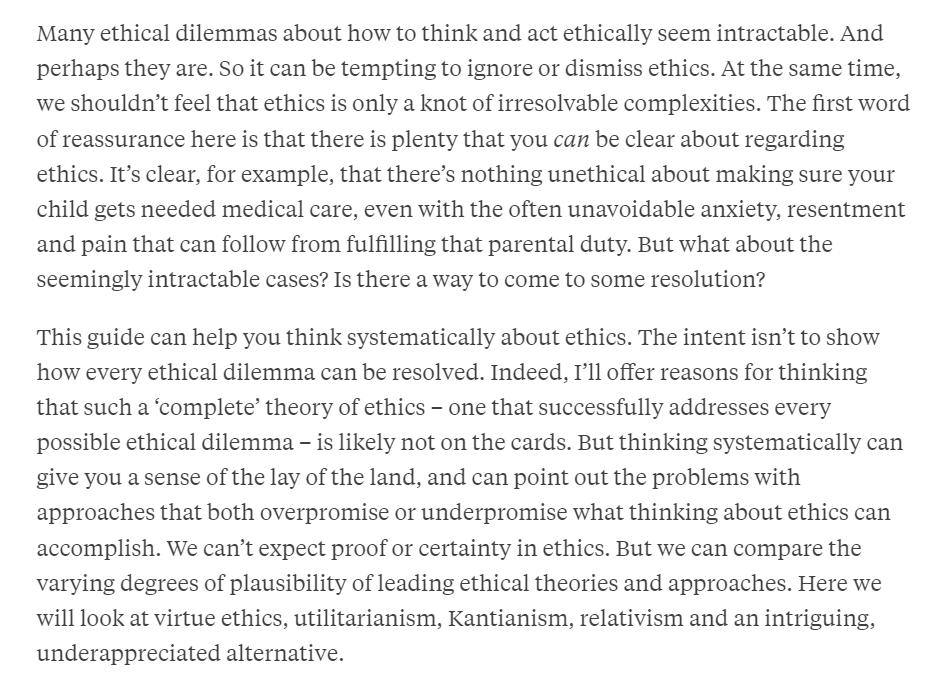
snip
How to think about ethical dilemmas

Learning about ethical theories won’t give you easy answers, but will increase your confidence in how you choose to live
https://psyche.co/guides/how-to-think-about-ethics-with-help-from-aristotle-and-kant



snip
September 27, 2023


https://www.washingtonpost.com/opinions/2023/09/26/nato-turkey-sweden-us-fighter-jets/
https://archive.ph/2Iuds

Turkish strongman Recep Tayyip Erdogan relishes his country’s role as the North Atlantic Treaty Organization’s swing state, pivoting not between one faction and another within the Western alliance but between the alliance itself and its main antagonist, Russia. Hence his bartering and gamesmanship, designed to enhance his role as power broker — and extract concessions — even as he subverts his own NATO allies. He has confounded analysts’ confident predictions that he would lift Ankara’s block on Sweden joining the alliance following Turkey’s presidential election, which he won in May, or certainly no later than NATO’s annual summit, which was in July.
At that session, he pledged that Turkey would permit Sweden’s accession later this year. Two days later, he changed his tune, saying the Turkish parliament, where he holds sway, would need to sign off. Mr. Erdogan’s obstructionism is contagious. It has apparently emboldened another problem child in NATO, Hungary. Having previously promised to back Sweden’s accession, Hungarian Prime Minister Viktor Orban has threatened to impede it, irked at Stockholm’s criticism of his authoritarian ways. As is often the case, given Mr. Erdogan’s transactional approach to international politics, there is a concession to be wrung before he agrees to open NATO’s doors to Sweden. He wants to finalize a deal to acquire $20 billion of U.S.-made F-16 fighters, along with modernization kits for the country’s aging fleet.
President Biden has backed the F-16 sale but made it clear to Mr. Erdogan that Congress has to sign off. And Mr. Biden’s influence in Congress is more limited than Mr. Erdogan’s in Turkey’s parliament. Members of Congress, who know how Mr. Erdogan operates, want Turkey’s hold on Sweden’s NATO membership definitively lifted before they will approve the full F-16 deal. Many of them are reluctant for the good reason that Turkey’s backsliding on democratic norms has accelerated. After meeting with Mr. Biden this month at the Group of 20 summit with major industrial nations, Mr. Erdogan expressed dismay, apparently without irony, that Mr. Biden was tying the F-16 package to Sweden.
The standoff is a bouquet for Russian President Vladimir Putin, with whom Mr. Erdogan has proclaimed he has a “special relationship.” The Turkish leader would be wise to reassess where his interests lie — with his NATO allies, whose combined economic output is roughly 10 times greater than Russia’s, or with the warmongers in the Kremlin, struggling to keep their economy in gear against the weight of Western sanctions. The Western alliance would be significantly strengthened by Sweden’s entry, and Stockholm is understandably frustrated at the delay. It cast aside decades of formal neutrality to apply for NATO membership shortly after Russia’s full-scale invasion of Ukraine in February 2022. Mindful of Mr. Erdogan’s stated objections to its joining the alliance, Stockholm has addressed Ankara’s concerns that it has failed to move aggressively against Kurds living in Sweden, whom Turkey considered terrorists. To that end, it has extradited several Kurds as requested by Turkey, and also modified its laws and constitution to permit tougher dealings with alleged terrorists. Last year, Stockholm also scrapped its arms embargo on Turkey.
snip
WaPo Editorial Board: Erdogan overplays his hand on Sweden's NATO bid


https://www.washingtonpost.com/opinions/2023/09/26/nato-turkey-sweden-us-fighter-jets/
https://archive.ph/2Iuds

Turkish strongman Recep Tayyip Erdogan relishes his country’s role as the North Atlantic Treaty Organization’s swing state, pivoting not between one faction and another within the Western alliance but between the alliance itself and its main antagonist, Russia. Hence his bartering and gamesmanship, designed to enhance his role as power broker — and extract concessions — even as he subverts his own NATO allies. He has confounded analysts’ confident predictions that he would lift Ankara’s block on Sweden joining the alliance following Turkey’s presidential election, which he won in May, or certainly no later than NATO’s annual summit, which was in July.
At that session, he pledged that Turkey would permit Sweden’s accession later this year. Two days later, he changed his tune, saying the Turkish parliament, where he holds sway, would need to sign off. Mr. Erdogan’s obstructionism is contagious. It has apparently emboldened another problem child in NATO, Hungary. Having previously promised to back Sweden’s accession, Hungarian Prime Minister Viktor Orban has threatened to impede it, irked at Stockholm’s criticism of his authoritarian ways. As is often the case, given Mr. Erdogan’s transactional approach to international politics, there is a concession to be wrung before he agrees to open NATO’s doors to Sweden. He wants to finalize a deal to acquire $20 billion of U.S.-made F-16 fighters, along with modernization kits for the country’s aging fleet.
President Biden has backed the F-16 sale but made it clear to Mr. Erdogan that Congress has to sign off. And Mr. Biden’s influence in Congress is more limited than Mr. Erdogan’s in Turkey’s parliament. Members of Congress, who know how Mr. Erdogan operates, want Turkey’s hold on Sweden’s NATO membership definitively lifted before they will approve the full F-16 deal. Many of them are reluctant for the good reason that Turkey’s backsliding on democratic norms has accelerated. After meeting with Mr. Biden this month at the Group of 20 summit with major industrial nations, Mr. Erdogan expressed dismay, apparently without irony, that Mr. Biden was tying the F-16 package to Sweden.
The standoff is a bouquet for Russian President Vladimir Putin, with whom Mr. Erdogan has proclaimed he has a “special relationship.” The Turkish leader would be wise to reassess where his interests lie — with his NATO allies, whose combined economic output is roughly 10 times greater than Russia’s, or with the warmongers in the Kremlin, struggling to keep their economy in gear against the weight of Western sanctions. The Western alliance would be significantly strengthened by Sweden’s entry, and Stockholm is understandably frustrated at the delay. It cast aside decades of formal neutrality to apply for NATO membership shortly after Russia’s full-scale invasion of Ukraine in February 2022. Mindful of Mr. Erdogan’s stated objections to its joining the alliance, Stockholm has addressed Ankara’s concerns that it has failed to move aggressively against Kurds living in Sweden, whom Turkey considered terrorists. To that end, it has extradited several Kurds as requested by Turkey, and also modified its laws and constitution to permit tougher dealings with alleged terrorists. Last year, Stockholm also scrapped its arms embargo on Turkey.
snip
Profile Information
Gender: FemaleHometown: London
Home country: US/UK/Sweden
Current location: Stockholm, Sweden
Member since: Sun Jul 1, 2018, 07:25 PM
Number of posts: 43,383
